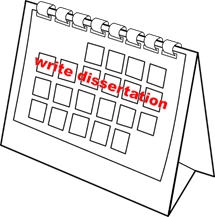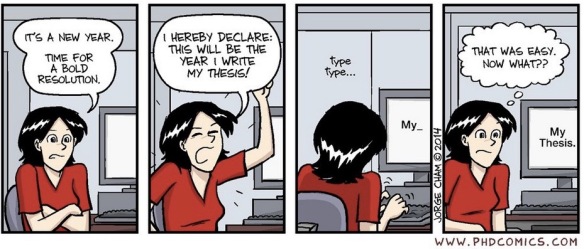Want to Get your Dissertation Accepted?
Discover how we've helped doctoral students complete their dissertations and advance their academic careers!

Join 200+ Graduated Students

Get Your Dissertation Accepted On Your Next Submission
Get customized coaching for:.
- Crafting your proposal,
- Collecting and analyzing your data, or
- Preparing your defense.
Trapped in dissertation revisions?
How long does it take to write a dissertation, published by steve tippins on july 11, 2019 july 11, 2019.
Last Updated on: 2nd February 2024, 05:00 am
How long does it take to write a dissertation? The most accurate (and least helpful) answer is, it depends. Since that’s probably not the answer you’re looking for, I’ll use the rest of the article to address the realities of how long it takes to write a dissertation.
How Long Does It Take to Write a Dissertation?
Based on my experience, writing your dissertation should take somewhere between 13-20 months. These are average numbers based upon the scores of doctoral students that I have worked with over the years, and they generally hold true.
I have seen people take less time and more time, but I believe that with concerted effort, the 13-20 month timeframe is reasonable.
“Based on my experience, writing your dissertation should take somewhere between 13-20 months.”
University Requirements
Once you hit the dissertation stage, some schools require a minimum number of hours in the dissertation area before you can graduate. Many schools require the equivalent of one year of dissertation credits to graduate.
So, even if you can finish your dissertation in three months, you will still have to pay for nine more months of dissertation credits before you can graduate. However, unless research and writing is your superpower, I wouldn’t worry about having to pay extra tuition.
But this requirement does offer some insight into how long it takes to write a dissertation. Based on this requirement, it’s reasonable to expect that writing your dissertation will take a year of more. This is consistent with my experience.

However, this timeframe is based on several assumptions. First, I am assuming that you are continually working towards finishing your dissertation. This means that no family emergencies, funding conundrums, or work issues get in the way of completing. Second, there are no major changes in your dissertation committee. Third, you will have access to the data that you need.
Assuming these assumptions hold true, this article should give you a general idea of how long it might take to write your dissertation.
How Long Does it Take to Write A Dissertation? Stage-By-Stage
Let’s break down each stage of the dissertation writing process and how long it takes.
Prospectus
This is the hardest one to judge, as this is where you lay the groundwork for the rest of your dissertation and get buy-in from committee members. Normally this takes from 3-6 months. Not all of this is writing time, though–much of it is spent refining your topic and your approach.
Why does this stage take so long? For many people, starting to express themselves using an academic voice can take time. This can hold up the review process as your committee members ask for writing-related revisions before they even get to evaluating the content. Don’t worry, once you learn the academic language things will start to flow more easily.
One common mistake students make is lack of specificity, both in their writing in general and in their topic focus.
Proposal (Chapters 1-3)

Chapter 1 is often an expansion of your Prospectus. However, you’ll be expected to develop your ideas more and have even more specificity on things like your research question and methodology, so don’t underestimate how long this chapter will take.
Chapter 2 can take some time as you will be digging deep into the literature but I think this can be done in 3-4 months. One caution, some people, and committees, like to start with Chapter 2 so that you are immersed in the literature before completing Chapters 1 and 3. Regardless of where you start, 3-4 months is a good estimate.
Chapter 3 requires an in-depth explanation of your methodology. I suggest working closely with your Chair on this one to avoid multiple submissions and revisions. Get clear on your methodology and make sure you and your chair are on the same page before you write, and continue to check in with your chair, if possible, throughout the process.
IRB Approval
While this step can be full of details and require several iterations it seems that allowing 2 months is sufficient. Most schools have an IRB form that must be submitted. To save time you can usually start filling out the form while your committee is reviewing your Proposal.
Collecting Data
This step varies a great deal. If you are using readily available secondary data this can take a week but if you are interviewing hard to get individuals or have trouble finding a sufficient number of people for your sample this can take 4 months or more. I think 1-4 months should be appropriate
Chapters 4 and 5
These two chapters are the easiest to write as in Chapter 4 you are reporting your results and in Chapter 5 you explain what the results mean. I believe that these two chapters can be written in 2 months.

Defense and Completion
You will need to defend your dissertation and then go through all of the university requirements to finalize the completion of your dissertation. I would allow 2 months for this process.
Variables That Affect How Long It Takes to Write A Dissertation
When students say something like, “I’m going to finish my dissertation in three months,” they likely aren’t considering all of the variables besides the actual writing. Even if you’re a fast writer, you’ll have to wait on your committee’s comments,
Timing Issues
Many schools have response times for committee members. This is important when looking at how long it takes to finish a dissertation. For example, it you have two committee members and they each get up to 2 weeks for a review, it can take up to a month to get a document reviewed, each time you submit. So, plan for these periods of time when thinking about how long that it will take you.
Addressing Comments
How long it takes to write your dissertation also depends on your ability to address your committee’s comments thoroughly. It’s not uncommon for a committee member to send a draft back several times, even if their comments were addressed adequately, because they notice new issues each time they read it. Save yourself considerable time by making sure you address their comments fully, thus avoiding unnecessary time waiting to hear the same feedback.

This is the biggest variable in the dissertation model. How dedicated are you to the process? How much actual time do you have? How many outside interests/requirements do you have? Are you easily distracted? How clean does your workspace need to be? (This may seem like a strange thing to discuss, but many people need to work in a clean space and can get very interested in cleaning if they have to write). Are you in a full-time program or in a part time program? Are you holding down a job? Do you have children?
All of these things will affect how much time you have to put into writing–or rather, how disciplined you need to be about making time to write.
One of the things that can influence how long it takes to write your dissertation is your committee. Choose your committee wisely. If you work under the assumption that the only good dissertation is a done dissertation, then you want a committee that will be helpful and not trying to prove themselves on your back. When you find a Chair that you can work with ask her/him which of their colleagues they work well with (it’s also worth finding out who they don’t work well with).
Find out how they like to receive material to review. Some members like to see pieces of chapters and some like to see completed documents. Once you know their preferences, you can efficiently submit what they want when they want it.
How Long Does it Take to Write a Dissertation? Summary
Barring unforeseen events, the normal time range for finishing a dissertation seems to be 13-19 months, which can be rounded to one to one and a half years. If you are proactive and efficient, you can usually be at the shorter end of the time range.

That means using downtime to do things like changing the tense of your approved Proposal from future tense to past tense and completing things like you Abstract and Acknowledgement sections before final approval.
I hope that you can be efficient in this process and finish as quickly as possible. Remember, “the only good dissertation is a done dissertation.”
On that note, I offer coaching services to help students through the dissertation writing process, as well as editing services for those who need help with their writing.
Steve Tippins
Steve Tippins, PhD, has thrived in academia for over thirty years. He continues to love teaching in addition to coaching recent PhD graduates as well as students writing their dissertations. Learn more about his dissertation coaching and career coaching services. Book a Free Consultation with Steve Tippins
Related Posts

Dissertation
What makes a good research question.
Creating a good research question is vital to successfully completing your dissertation. Here are some tips that will help you formulate a good research question. What Makes a Good Research Question? These are the three Read more…

Dissertation Structure
When it comes to writing a dissertation, one of the most fraught questions asked by graduate students is about dissertation structure. A dissertation is the lengthiest writing project that many graduate students ever undertake, and Read more…

Choosing a Dissertation Chair
Choosing your dissertation chair is one of the most important decisions that you’ll make in graduate school. Your dissertation chair will in many ways shape your experience as you undergo the most rigorous intellectual challenge Read more…
Make This Your Last Round of Dissertation Revision.
Learn How to Get Your Dissertation Accepted .
Discover the 5-Step Process in this Free Webinar .
Almost there!
Please verify your email address by clicking the link in the email message we just sent to your address.
If you don't see the message within the next five minutes, be sure to check your spam folder :).
How to Write a Dissertation: Step-by-Step Guide

Contributing Writer

Editor & Writer
www.bestcolleges.com is an advertising-supported site. Featured or trusted partner programs and all school search, finder, or match results are for schools that compensate us. This compensation does not influence our school rankings, resource guides, or other editorially-independent information published on this site.
Turn Your Dreams Into Reality
Take our quiz and we'll do the homework for you! Compare your school matches and apply to your top choice today.
- Doctoral students write and defend dissertations to earn their degrees.
- Most dissertations range from 100-300 pages, depending on the field.
- Taking a step-by-step approach can help students write their dissertations.
Whether you're considering a doctoral program or you recently passed your comprehensive exams, you've probably wondered how to write a dissertation. Researching, writing, and defending a dissertation represents a major step in earning a doctorate.
But what is a dissertation exactly? A dissertation is an original work of scholarship that contributes to the field. Doctoral candidates often spend 1-3 years working on their dissertations. And many dissertations top 200 or more pages.
Starting the process on the right foot can help you complete a successful dissertation. Breaking down the process into steps may also make it easier to finish your dissertation.
How to Write a Dissertation in 12 Steps
A dissertation demonstrates mastery in a subject. But how do you write a dissertation? Here are 12 steps to successfully complete a dissertation.
Choose a Topic
It sounds like an easy step, but choosing a topic will play an enormous role in the success of your dissertation. In some fields, your dissertation advisor will recommend a topic. In other fields, you'll develop a topic on your own.
Read recent work in your field to identify areas for additional scholarship. Look for holes in the literature or questions that remain unanswered.
After coming up with a few areas for research or questions, carefully consider what's feasible with your resources. Talk to your faculty advisor about your ideas and incorporate their feedback.
Conduct Preliminary Research
Before starting a dissertation, you'll need to conduct research. Depending on your field, that might mean visiting archives, reviewing scholarly literature , or running lab tests.
Use your preliminary research to hone your question and topic. Take lots of notes, particularly on areas where you can expand your research.
Read Secondary Literature
A dissertation demonstrates your mastery of the field. That means you'll need to read a large amount of scholarship on your topic. Dissertations typically include a literature review section or chapter.
Create a list of books, articles, and other scholarly works early in the process, and continue to add to your list. Refer to the works cited to identify key literature. And take detailed notes to make the writing process easier.
Write a Research Proposal
In most doctoral programs, you'll need to write and defend a research proposal before starting your dissertation.
The length and format of your proposal depend on your field. In many fields, the proposal will run 10-20 pages and include a detailed discussion of the research topic, methodology, and secondary literature.
Your faculty advisor will provide valuable feedback on turning your proposal into a dissertation.
Research, Research, Research
Doctoral dissertations make an original contribution to the field, and your research will be the basis of that contribution.
The form your research takes will depend on your academic discipline. In computer science, you might analyze a complex dataset to understand machine learning. In English, you might read the unpublished papers of a poet or author. In psychology, you might design a study to test stress responses. And in education, you might create surveys to measure student experiences.
Work closely with your faculty advisor as you conduct research. Your advisor can often point you toward useful resources or recommend areas for further exploration.
Look for Dissertation Examples
Writing a dissertation can feel overwhelming. Most graduate students have written seminar papers or a master's thesis. But a dissertation is essentially like writing a book.
Looking at examples of dissertations can help you set realistic expectations and understand what your discipline wants in a successful dissertation. Ask your advisor if the department has recent dissertation examples. Or use a resource like ProQuest Dissertations to find examples.
Doctoral candidates read a lot of monographs and articles, but they often do not read dissertations. Reading polished scholarly work, particularly critical scholarship in your field, can give you an unrealistic standard for writing a dissertation.
Write Your Body Chapters
By the time you sit down to write your dissertation, you've already accomplished a great deal. You've chosen a topic, defended your proposal, and conducted research. Now it's time to organize your work into chapters.
As with research, the format of your dissertation depends on your field. Your department will likely provide dissertation guidelines to structure your work. In many disciplines, dissertations include chapters on the literature review, methodology, and results. In other disciplines, each chapter functions like an article that builds to your overall argument.
Start with the chapter you feel most confident in writing. Expand on the literature review in your proposal to provide an overview of the field. Describe your research process and analyze the results.
Meet With Your Advisor
Throughout the dissertation process, you should meet regularly with your advisor. As you write chapters, send them to your advisor for feedback. Your advisor can help identify issues and suggest ways to strengthen your dissertation.
Staying in close communication with your advisor will also boost your confidence for your dissertation defense. Consider sharing material with other members of your committee as well.
Write Your Introduction and Conclusion
It seems counterintuitive, but it's a good idea to write your introduction and conclusion last . Your introduction should describe the scope of your project and your intervention in the field.
Many doctoral candidates find it useful to return to their dissertation proposal to write the introduction. If your project evolved significantly, you will need to reframe the introduction. Make sure you provide background information to set the scene for your dissertation. And preview your methodology, research aims, and results.
The conclusion is often the shortest section. In your conclusion, sum up what you've demonstrated, and explain how your dissertation contributes to the field.
Edit Your Draft
You've completed a draft of your dissertation. Now, it's time to edit that draft.
For some doctoral candidates, the editing process can feel more challenging than researching or writing the dissertation. Most dissertations run a minimum of 100-200 pages , with some hitting 300 pages or more.
When editing your dissertation, break it down chapter by chapter. Go beyond grammar and spelling to make sure you communicate clearly and efficiently. Identify repetitive areas and shore up weaknesses in your argument.
Incorporate Feedback
Writing a dissertation can feel very isolating. You're focused on one topic for months or years, and you're often working alone. But feedback will strengthen your dissertation.
You will receive feedback as you write your dissertation, both from your advisor and other committee members. In many departments, doctoral candidates also participate in peer review groups to provide feedback.
Outside readers will note confusing sections and recommend changes. Make sure you incorporate the feedback throughout the writing and editing process.
Defend Your Dissertation
Congratulations — you made it to the dissertation defense! Typically, your advisor will not let you schedule the defense unless they believe you will pass. So consider the defense a culmination of your dissertation process rather than a high-stakes examination.
The format of your defense depends on the department. In some fields, you'll present your research. In other fields, the defense will consist of an in-depth discussion with your committee.
Walk into your defense with confidence. You're now an expert in your topic. Answer questions concisely and address any weaknesses in your study. Once you pass the defense, you'll earn your doctorate.
Writing a dissertation isn't easy — only around 55,000 students earned a Ph.D. in 2020, according to the National Center for Science and Engineering Statistics. However, it is possible to successfully complete a dissertation by breaking down the process into smaller steps.
Frequently Asked Questions About Dissertations
What is a dissertation.
A dissertation is a substantial research project that contributes to your field of study. Graduate students write a dissertation to earn their doctorate.
The format and content of a dissertation vary widely depending on the academic discipline. Doctoral candidates work closely with their faculty advisor to complete and defend the dissertation, a process that typically takes 1-3 years.
How long is a dissertation?
The length of a dissertation varies by field. Harvard's graduate school says most dissertations fall between 100-300 pages .
Doctoral candidate Marcus Beck analyzed the length of University of Minnesota dissertations by discipline and found that history produces the longest dissertations, with an average of nearly 300 pages, while mathematics produces the shortest dissertations at just under 100 pages.
What's the difference between a dissertation vs. a thesis?
Dissertations and theses demonstrate academic mastery at different levels. In U.S. graduate education, master's students typically write theses, while doctoral students write dissertations. The terms are reversed in the British system.
In the U.S., a dissertation is longer, more in-depth, and based on more research than a thesis. Doctoral candidates write a dissertation as the culminating research project of their degree. Undergraduates and master's students may write shorter theses as part of their programs.
Explore More College Resources
How to write an effective thesis statement.

How to Write a Research Paper: 11-Step Guide

How to Write a History Essay, According to a History Professor
BestColleges.com is an advertising-supported site. Featured or trusted partner programs and all school search, finder, or match results are for schools that compensate us. This compensation does not influence our school rankings, resource guides, or other editorially-independent information published on this site.
Compare Your School Options
View the most relevant schools for your interests and compare them by tuition, programs, acceptance rate, and other factors important to finding your college home.
Have a language expert improve your writing
Run a free plagiarism check in 10 minutes, automatically generate references for free.
- Knowledge Base
- Dissertation
What Is a Dissertation? | 5 Essential Questions to Get Started
Published on 26 March 2020 by Jack Caulfield . Revised on 5 May 2022.
A dissertation is a large research project undertaken at the end of a degree. It involves in-depth consideration of a problem or question chosen by the student. It is usually the largest (and final) piece of written work produced during a degree.
The length and structure of a dissertation vary widely depending on the level and field of study. However, there are some key questions that can help you understand the requirements and get started on your dissertation project.
Instantly correct all language mistakes in your text
Be assured that you'll submit flawless writing. Upload your document to correct all your mistakes.

Table of contents
When and why do you have to write a dissertation, who will supervise your dissertation, what type of research will you do, how should your dissertation be structured, what formatting and referencing rules do you have to follow, frequently asked questions about dissertations.
A dissertation, sometimes called a thesis, comes at the end of an undergraduate or postgraduate degree. It is a larger project than the other essays you’ve written, requiring a higher word count and a greater depth of research.
You’ll generally work on your dissertation during the final year of your degree, over a longer period than you would take for a standard essay . For example, the dissertation might be your main focus for the last six months of your degree.
Why is the dissertation important?
The dissertation is a test of your capacity for independent research. You are given a lot of autonomy in writing your dissertation: you come up with your own ideas, conduct your own research, and write and structure the text by yourself.
This means that it is an important preparation for your future, whether you continue in academia or not: it teaches you to manage your own time, generate original ideas, and work independently.
The only proofreading tool specialized in correcting academic writing
The academic proofreading tool has been trained on 1000s of academic texts and by native English editors. Making it the most accurate and reliable proofreading tool for students.

Correct my document today
During the planning and writing of your dissertation, you’ll work with a supervisor from your department. The supervisor’s job is to give you feedback and advice throughout the process.
The dissertation supervisor is often assigned by the department, but you might be allowed to indicate preferences or approach potential supervisors. If so, try to pick someone who is familiar with your chosen topic, whom you get along with on a personal level, and whose feedback you’ve found useful in the past.
How will your supervisor help you?
Your supervisor is there to guide you through the dissertation project, but you’re still working independently. They can give feedback on your ideas, but not come up with ideas for you.
You may need to take the initiative to request an initial meeting with your supervisor. Then you can plan out your future meetings and set reasonable deadlines for things like completion of data collection, a structure outline, a first chapter, a first draft, and so on.
Make sure to prepare in advance for your meetings. Formulate your ideas as fully as you can, and determine where exactly you’re having difficulties so you can ask your supervisor for specific advice.
Your approach to your dissertation will vary depending on your field of study. The first thing to consider is whether you will do empirical research , which involves collecting original data, or non-empirical research , which involves analysing sources.
Empirical dissertations (sciences)
An empirical dissertation focuses on collecting and analysing original data. You’ll usually write this type of dissertation if you are studying a subject in the sciences or social sciences.
- What are airline workers’ attitudes towards the challenges posed for their industry by climate change?
- How effective is cognitive behavioural therapy in treating depression in young adults?
- What are the short-term health effects of switching from smoking cigarettes to e-cigarettes?
There are many different empirical research methods you can use to answer these questions – for example, experiments , observations, surveys , and interviews.
When doing empirical research, you need to consider things like the variables you will investigate, the reliability and validity of your measurements, and your sampling method . The aim is to produce robust, reproducible scientific knowledge.
Non-empirical dissertations (arts and humanities)
A non-empirical dissertation works with existing research or other texts, presenting original analysis, critique and argumentation, but no original data. This approach is typical of arts and humanities subjects.
- What attitudes did commentators in the British press take towards the French Revolution in 1789–1792?
- How do the themes of gender and inheritance intersect in Shakespeare’s Macbeth ?
- How did Plato’s Republic and Thomas More’s Utopia influence nineteenth century utopian socialist thought?
The first steps in this type of dissertation are to decide on your topic and begin collecting your primary and secondary sources .
Primary sources are the direct objects of your research. They give you first-hand evidence about your subject. Examples of primary sources include novels, artworks and historical documents.
Secondary sources provide information that informs your analysis. They describe, interpret, or evaluate information from primary sources. For example, you might consider previous analyses of the novel or author you are working on, or theoretical texts that you plan to apply to your primary sources.
Dissertations are divided into chapters and sections. Empirical dissertations usually follow a standard structure, while non-empirical dissertations are more flexible.
Structure of an empirical dissertation
Empirical dissertations generally include these chapters:
- Introduction : An explanation of your topic and the research question(s) you want to answer.
- Literature review : A survey and evaluation of previous research on your topic.
- Methodology : An explanation of how you collected and analysed your data.
- Results : A brief description of what you found.
- Discussion : Interpretation of what these results reveal.
- Conclusion : Answers to your research question(s) and summary of what your findings contribute to knowledge in your field.
Sometimes the order or naming of chapters might be slightly different, but all of the above information must be included in order to produce thorough, valid scientific research.
Other dissertation structures
If your dissertation doesn’t involve data collection, your structure is more flexible. You can think of it like an extended essay – the text should be logically organised in a way that serves your argument:
- Introduction: An explanation of your topic and the question(s) you want to answer.
- Main body: The development of your analysis, usually divided into 2–4 chapters.
- Conclusion: Answers to your research question(s) and summary of what your analysis contributes to knowledge in your field.
The chapters of the main body can be organised around different themes, time periods, or texts. Below you can see some example structures for dissertations in different subjects.
- Political philosophy
This example, on the topic of the British press’s coverage of the French Revolution, shows how you might structure each chapter around a specific theme.

This example, on the topic of Plato’s and More’s influences on utopian socialist thought, shows a different approach to dividing the chapters by theme.

This example, a master’s dissertation on the topic of how writers respond to persecution, shows how you can also use section headings within each chapter. Each of the three chapters deals with a specific text, while the sections are organised thematically.

Prevent plagiarism, run a free check.
Like other academic texts, it’s important that your dissertation follows the formatting guidelines set out by your university. You can lose marks unnecessarily over mistakes, so it’s worth taking the time to get all these elements right.
Formatting guidelines concern things like:
- line spacing
- page numbers
- punctuation
- title pages
- presentation of tables and figures
If you’re unsure about the formatting requirements, check with your supervisor or department. You can lose marks unnecessarily over mistakes, so it’s worth taking the time to get all these elements right.
How will you reference your sources?
Referencing means properly listing the sources you cite and refer to in your dissertation, so that the reader can find them. This avoids plagiarism by acknowledging where you’ve used the work of others.
Keep track of everything you read as you prepare your dissertation. The key information to note down for a reference is:
- The publication date
- Page numbers for the parts you refer to (especially when using direct quotes)
Different referencing styles each have their own specific rules for how to reference. The most commonly used styles in UK universities are listed below.
You can use the free APA Reference Generator to automatically create and store your references.
APA Reference Generator
The words ‘ dissertation ’ and ‘thesis’ both refer to a large written research project undertaken to complete a degree, but they are used differently depending on the country:
- In the UK, you write a dissertation at the end of a bachelor’s or master’s degree, and you write a thesis to complete a PhD.
- In the US, it’s the other way around: you may write a thesis at the end of a bachelor’s or master’s degree, and you write a dissertation to complete a PhD.
The main difference is in terms of scale – a dissertation is usually much longer than the other essays you complete during your degree.
Another key difference is that you are given much more independence when working on a dissertation. You choose your own dissertation topic , and you have to conduct the research and write the dissertation yourself (with some assistance from your supervisor).
Dissertation word counts vary widely across different fields, institutions, and levels of education:
- An undergraduate dissertation is typically 8,000–15,000 words
- A master’s dissertation is typically 12,000–50,000 words
- A PhD thesis is typically book-length: 70,000–100,000 words
However, none of these are strict guidelines – your word count may be lower or higher than the numbers stated here. Always check the guidelines provided by your university to determine how long your own dissertation should be.
At the bachelor’s and master’s levels, the dissertation is usually the main focus of your final year. You might work on it (alongside other classes) for the entirety of the final year, or for the last six months. This includes formulating an idea, doing the research, and writing up.
A PhD thesis takes a longer time, as the thesis is the main focus of the degree. A PhD thesis might be being formulated and worked on for the whole four years of the degree program. The writing process alone can take around 18 months.
Cite this Scribbr article
If you want to cite this source, you can copy and paste the citation or click the ‘Cite this Scribbr article’ button to automatically add the citation to our free Reference Generator.
Caulfield, J. (2022, May 05). What Is a Dissertation? | 5 Essential Questions to Get Started. Scribbr. Retrieved 13 May 2024, from https://www.scribbr.co.uk/thesis-dissertation/what-is-a-dissertation/
Is this article helpful?

Jack Caulfield
Other students also liked, how to choose a dissertation topic | 8 steps to follow, how to write a dissertation proposal | a step-by-step guide, what is a literature review | guide, template, & examples.
EdDPrograms.org
What is an Ed.D. Dissertation? Complete Guide & Support Resources
Wondering how to tackle the biggest doctoral challenge of all? Use our guide to the Ed.D. dissertation to get started! Learn about the purpose of a Doctor of Education dissertation and typical topics for education students. Read through step-by-step descriptions of the dissertation process and the 5-chapter format. Get answers to Ed.D. dissertation FAQs . Or skip to the chase and find real-world examples of Doctor of Education dissertations and websites & resources for Ed.D. dissertation research.
What is an Ed.D. Dissertation?
Definition of an ed.d. dissertation.
An Ed.D. dissertation is a 5-chapter scholarly document that brings together years of original research to address a problem of practice in education. To complete a dissertation, you will need to go through a number of scholarly steps , including a final defense to justify your findings.
Purpose of an Ed.D. Dissertation
In a Doctor of Education dissertation, you will be challenged to apply high-level research & creative problem-solving to real-world educational challenges. You may be asked to:
- Take a critical look at current educational & administrative practices
- Address urgent issues in the modern education system
- Propose original & practical solutions for improvements
- Expand the knowledge base for educational practitioners
Topics of Ed.D. Dissertations
An Ed.D. dissertation is “customizable.” You’re allowed to chose a topic that relates to your choice of specialty (e.g. elementary education), field of interest (e.g. curriculum development), and environment (e.g. urban schools).
Think about current problems of practice that need to be addressed in your field. You’ll notice that Ed.D. dissertation topics often address one of the following:
- Academic performance
- Teaching methods
- Access to resources
- Social challenges
- Legislative impacts
- System effectiveness
Wondering how others have done it? Browse through Examples of Ed.D. Dissertations and read the titles & abstracts. You’ll see how current educators are addressing their own problems of practice.
Ed.D. Dissertation Process
1. propose a dissertation topic.
Near the beginning of a Doctor of Education program, you’ll be expected to identify a dissertation topic that will require substantial research. This topic should revolve around a unique issue in education.
Universities will often ask you to provide an idea for your topic when you’re applying to the doctoral program. You don’t necessarily need to stick to this idea, but you should be prepared to explain why it interests you. If you need inspiration, see our section on Examples of Ed.D. Dissertations .
You’ll be expected to solidify your dissertation topic in the first few semesters. Talking to faculty and fellow Ed.D. students can help in this process. Better yet, your educational peers will often be able to provide unique perspectives on the topic (e.g. cultural differences in teaching methods).
2. Meet Your Dissertation Chair & Committee
You won’t be going through the Ed.D. dissertation process alone! Universities will help you to select a number of experienced mentors. These include:
- Dissertation Chair/Faculty Advisor: The Chair of the Dissertation Committee acts as your primary advisor. You’ll often see them referred to as the Supervising Professor, Faculty Advisor, or the like. You’ll rely on this “Obi Wan” for their knowledge of the field, research advice & guidance, editorial input on drafts, and more. They can also assist with shaping & refining your dissertation topic.
- Dissertation Committee: The Dissertation Committee is made up of ~3 faculty members, instructors and/or adjuncts with advanced expertise in your field of study. The Committee will offer advice, provide feedback on your research progress, and review your work & progress reports. When you defend your proposal and give your final defense , you’ll be addressing the Dissertation Committee.
3. Study for Ed.D. Courses
Doctor of Education coursework is designed to help you: a) learn how to conduct original research; and b) give you a broader perspective on your field of interest. If you take a look at the curriculum in any Ed.D. program, you’ll see that students have to complete credits in:
- Practical Research Methods (e.g. Quantitative Design & Analysis for Educational Leaders)
- Real-World Educational Issues (e.g. Educational Policy, Law & Practice)
When you’re evaluating possible Ed.D. programs, pay attention to the coursework in real-world educational issues. You’ll want to pick an education doctorate with courses that complement your dissertation topic.
4. Complete a Literature Review
A literature review is an evaluation of existing materials & research work that relate to your dissertation topic. It’s a written synthesis that:
- Grounds your project within the field
- Explains how your work relates to previous research & theoretical frameworks
- Helps to identify gaps in the existing research
Have a look at Literature Review Guides if you’d like to know more about the process. Our section on Resources for Ed.D. Dissertation Research also has useful links to journals & databases.
5. Craft a Dissertation Proposal
During the first two years of your Doctor of Education, you’ll use the knowledge you’ve learned from your coursework & discussions to write the opening chapters of your dissertation, including an:
- Introduction that defines your chosen topic
- Literature Review of existing research in the field
- Proposed Research Methodology for finding the answer to your problem
When you’re putting together these elements, think about the practicals. Is the topic too big to address in one dissertation? How much time will your research take and how will you conduct it? Will your dissertation be relevant to your current job? If in doubt, ask your faculty advisor.
6. Defend Your Dissertation Proposal
About midway through the Ed.D. program, you will need to present your proposal to your Dissertation Committee. They will review your work and offer feedback. For example, the Committee will want to see that:
- Your research topic is significant.
- Your research methodology & timeline make sense.
- Relevant works are included in the literature review.
After the Committee approves your proposal, you can get stuck into conducting original research and writing up your findings. These two important tasks will take up the final years of your doctorate.
7. Conduct Original Research into Your Topic
As a Doctor of Education student, you will be expected to conduct your own research. Ed.D. students often use a qualitative, quantitative, or mixed methods (quantitative/qualitative) approach in this process.
- Quantitative Research: Collection & analysis of numerical data to identify characteristics, discover correlations, and/or test hypotheses.
- Qualitative Research: Collection & analysis of non-numerical data to understand & explain phenomena (e.g. questionnaires, in-depth interviews, focus groups, video artifacts, etc.).
Your Ed.D. coursework will ground you in research methods & tools, so you’ll be prepared to design your own project and seek IRB approval for any work involving human subjects.
Note: Occasionally, universities can get creative. For example, the Ed.D. program at San Jose State University asks students to produce a documentary film instead of conducting traditional research.
8. Write the Rest of Your Dissertation
Once you have written up the first few chapters of your dissertation (Intro, Literature Review & Proposed Methodology) and completed your research work, you’ll be able to complete the final chapters of your dissertation.
- Chapter 4 will detail your research findings.
- Chapter 5 is a conclusion that summarizes solutions to your problem of practice/topic.
This is where you and your faculty advisor will often have a lot of interaction! For example, you may need to rework the first few chapters of your dissertation after you’ve drafted the final chapters. Faculty advisors are extremely busy people, so be sure to budget in ample time for revisions and final edits.
9. Defend Your Dissertation
The final defense/candidacy exam is a formal presentation of your work to the Dissertation Committee. In many cases, the defense is an oral presentation with visual aides. You’ll be able to explain your research findings, go through your conclusions, and highlight new ideas & solutions.
At any time, the Committee can challenge you with questions, so you should be prepared to defend your conclusions. But this process is not as frightening as it sounds!
- If you’ve been in close contact with the Committee throughout the dissertation, they will be aware of your work.
- Your faculty advisor will help you decide when you’re ready for the final defense.
- You can also attend the defenses of other Ed.D. students to learn what questions may be asked.
Be aware that the Committee has the option to ask for changes before they approve your dissertation. After you have incorporated any notes from the Committee and addressed their concerns, you will finalize the draft, submit your dissertation for a formal review, and graduate.
Ed.D. Dissertation Format: 5 Chapters
Chapter 1: introduction.
Your Doctor of Education dissertation will begin with an introduction. In it, you’ll be expected to:
- Provide an overview of your educational landscape
- Explain important definitions & key concepts
- Define a real-world topic/problem of practice
- Outline the need for new studies on this topic
Chapter 2: Literature Review
The literature review is a summary of existing research in the field. However, it is not an annotated bibliography. Instead, it’s a critical analysis of current research (e.g. trends, themes, debates & current practices). While you’re evaluating the literature, you’re also looking for the gaps where you can conduct original research.
Sources for a literature review can include books, articles, reports, websites, dissertations, and more. Our section on Resources for Ed.D. Dissertation Research has plenty of places to start.
Chapter 3: Research Methodology
In the research methodology, you’ll be expected to explain:
- The purpose of your research
- What tools & methods you plan to use to research your topic/problem of practice
- The design of the study
- Your timeline for gathering quantitative & qualitative data
- How you plan to analyze that data
- Any limitations you foresee
Chapter 4: Results & Analysis
Chapter 4 is the place where you can share the results of your original research and present key findings from the data. In your analysis, you may also be highlighting new patterns, relationships, and themes that other scholars have failed to discover. Have a look at real-life Examples of Ed.D. Dissertations to see how this section is structured.
Chapter 5: Discussions & Conclusions
The final chapter of your Ed.D. dissertation brings all of your work together in a detailed summary. You’ll be expected to:
- Reiterate the objectives of your dissertation
- Explain the significance of your research findings
- Outline the implications of your ideas on existing practices
- Propose solutions for a problem of practice
- Make suggestions & recommendations for future improvements
Ed.D. Dissertation FAQs
What’s the difference between a dissertation and a thesis.
- Dissertation: A dissertation is a 5-chapter written work that must be completed in order to earn a doctoral degree (e.g. Ph.D., Ed.D., etc.). It’s often focused on original research.
- Thesis: A thesis is a written work that must be completed in order to earn a master’s degree. It’s typically shorter than a dissertation and based on existing research.
How Long is a Ed.D. Dissertation?
It depends. Most Ed.D. dissertations end up being between 80-200 pages. The length will depend on a number of factors, including the depth of your literature review, the way you collect & present your research data, and any appendices you might need to include.
How Long Does it Take to Finish an Ed.D. Dissertation?
It depends. If you’re in an accelerated program , you may be able to finish your dissertation in 2-3 years. If you’re in a part-time program and need to conduct a lot of complex research work, your timeline will be much longer.
What’s a Strong Ed.D. Dissertation Topic?
Experts always say that Doctor of Education students should be passionate about their dissertation topic and eager to explore uncharted territory. When you’re crafting your Ed.D. dissertation topic , find one that will be:
- Significant
See the section on Examples of Ed.D. Dissertations for inspiration.
Do I Have to Complete a Traditional Dissertation for an Ed.D.?
No. If you’re struggling with the idea of a traditional dissertation, check out this guide to Online Ed.D. Programs with No Dissertation . Some Schools of Education give Ed.D. students the opportunity to complete a Capstone Project or Dissertation in Practice (DiP) instead of a 5-chapter written work.
These alternatives aren’t easy! You’ll still be challenged at the same level as you would be for a dissertation. However, Capstone Projects & DiPs often involve more group work and an emphasis on applied theory & research.
What’s the Difference Between a Ph.D. Dissertation and Ed.D. Dissertation?
Have a look at our Ed.D. vs. Ph.D. Guide to get a sense of the differences between the two degrees. In a nutshell:
- Ed.D. dissertations tend to focus on addressing current & real-world topics/problems of practice in the workplace.
- Ph.D. dissertations usually put more emphasis on creating new theories & concepts and even completely rethinking educational practices.
How Can I Learn More About Ed.D. Dissertations?
Start with the section on Examples of Ed.D. Dissertations . You can browse through titles, abstracts, and even complete dissertations from a large number of universities.
If you have a few Doctor of Education programs on your shortlist, we also recommend that you skim through the program’s Dissertation Handbook . It can usually be found on the School of Education’s website. You’ll be able to see how the School likes to structure the dissertation process from start to finish.
Ed.D. Dissertation Support
University & campus resources, dissertation chair & committee.
The first port of call for any questions about the Ed.D. dissertation is your Dissertation Chair. If you get stuck with a terrible faculty advisor, talk to members of the Dissertation Committee. They are there to support your journey.
University Library
An Ed.D. dissertation is a massive research project. So before you choose a Doctor of Education program, ask the School of Education about its libraries & library resources (e.g. free online access to subscription-based journals).
Writing Center
Many universities have a Writing Center. If you’re struggling with any elements of your dissertation (e.g. editing), you can ask the staff about:
- Individual tutoring
- Editorial assistance
- Outside resources
Mental Health Support
It’s well-known that doctoral students often face a lot of stress & isolation during their studies. Ask your faculty advisor about mental health services at the university. Staff in the School of Education and the Graduate School will also have information about on-campus counselors, free or discounted therapy sessions, and more.
Independent Dissertation Services
Dissertation editing services: potentially helpful.
There are scores of independent providers who offer dissertation editing services. But they can be expensive. And many of these editors have zero expertise in educational fields.
If you need help with editing & proofreading, proceed with caution:
- Start by asking your Dissertation Chair about what’s permitted for third party involvement (e.g. you may need to note any editor’s contribution in your dissertation acknowledgments) and whether they have any suggestions.
- The Graduate School is another useful resource. For example, Cornell’s Graduate School maintains a list of Editing, Typing, and Proofreading Services for graduate students.
Dissertation Coaches: Not Worth It
Dissertation coaches are defined as people who offer academic & mental support, guidance, and editorial input.
- That means the person who should be your coach is your Dissertation Chair/Faculty Advisor. Remember that faculty members on the Dissertation Committee can also provide assistance.
- If you’re looking for extra support, you might consider consulting a mentor in your line of work and collaborating with fellow Ed.D. students.
But hiring an independent Ed.D. dissertation coach is going to be an absolute waste of money.
Dissertation Writing Services: Just Don’t!
Universities take the dissertation process very seriously . An Ed.D. dissertation is supposed to be the culmination of years of original thought and research. You’re going to be responsible for the final product. You’re going to be defending your written work in front of a phalanx of experienced faculty members. You’re going to be putting this credential on your résumé for everyone to see.
If you cheat the process by having someone else write up your work, you will get caught.
Ed.D. Dissertation Resources
Examples of ed.d. dissertations, dissertation databases.
- Open Access Theses and Dissertations
- ProQuest Dissertations & Theses
- EBSCO Open Dissertations
Ed.D. Dissertations
- USF Scholarship Repository: Ed.D. Dissertations
- George Fox University: Doctor of Education
- UW Tacoma: Ed.D. Dissertations in Practice
- Liberty University: School of Education Doctoral Dissertations
- University of Mary Hardin-Baylor: Dissertation Collection
Ed.D. Dissertation Abstracts
- Michigan State University: Ed.D. Dissertation Abstracts
Ed.D. Dissertation Guides & Tools
General ed.d. guides.
- SNHU: Educational Leadership Ed.D./Ph.D. Guide
Dissertation Style Manuals
- Chicago Manual of Style
Style manuals are designed to ensure that every Ed.D. student follows the same set of writing guidelines for their dissertation (e.g. grammatical rules, footnote & quotation formats, abbreviation conventions, etc.). Check with the School of Education to learn which style manual they use.
Examples of Ed.D. Dissertation Templates
- Purdue University: Dissertation Template
- Walden University: Ed.D. Dissertation Template
Each School of Education has a standard dissertation template. We’ve highlighted a couple of examples so you can see how they’re formatted, but you will need to acquire the template from your own university.
Literature Review Guides
- UNC Chapel Hill: Writing Guide for Literature Reviews
- University of Alabama: How to Conduct a Literature Review
Resources for Ed.D. Dissertation Research
Journal articles.
- EBSCO Education Research Databases
- Education Resources Information Center (ERIC)
- Emerald Education eJournal Collection
- Gale OneFile: Educator’s Reference Complete
- Google Scholar
- NCES Bibliography Search Tool
- ProQuest Education Database
- SAGE Journals: Education
Useful Websites
- Harvard Gutman Library: Websites for Educators
- EduRef: Lesson Plans
Educational Data & Statistics
- Digest of Education Statistics
- Education Policy Data Center (EPDC)
- ICPSR Data Archive
- National Assessment of Educational Progress
- National Center for Education Statistics (NCES)
- UNESCO Institute for Statistics
How Long Does It Take to Write an Education Dissertation? Guide to Sharing Research Findings

Writing a dissertation is the culmination of a doctoral education program . It is an exacting task, calling for dedication and perseverance, especially when you experience time constraints due to work or family obligations. Gaining a clear understanding of how long it takes to write an education dissertation and carefully planning your dissertation process—from carving out time in your busy daily schedule to setting achievement milestones to keep a steady pace—are crucial steps to earning a doctoral degree.
It takes longer than a year for most PhD students to complete a first draft of a dissertation. Students typically spend one to two years conducting research and reviewing literature while they complete doctoral courses before tackling a dissertation draft. The writing process typically takes a year or two beyond that. It can take five or more years for PhD students who get stuck in research phases, experience writer’s block, or have a high level of distractions or time constraints. The average time for students to complete all requirements for a doctorate in the US is nearly six years, according to U.S. News & World Report .
The Education Dissertation Timeline
About how long will the dissertation process take? Many factors can influence the dissertation timeline length, such as:
- Job status : Doctoral students working in full- or part-time positions will need to be diligent about dedicating time to their dissertation work.
- Academic support : PhD students with strong support from faculty members, mentors, and peers are likely to find greater success in keeping the dissertation process on track.
- Topic selection : An initial dissertation topic’s success can keep a timeline on track. When doctoral students change a dissertation’s focus midstream, it typically adds extra research time.
- Time management : Writing a dissertation takes careful planning and scheduling. When students stick to their schedules and work efficiently, they’re more likely to complete their dissertations sooner.
The Dissertation Process
Before doctoral students can submit a dissertation proposal, they must complete all of their doctorate-level coursework and pass their comprehensive exams. This designates them as doctoral candidates. However, just because a student hasn’t achieved candidate status does not mean they can’t or shouldn’t start the dissertation process. On the contrary, students are expected to identify their dissertation topic and start preparing for the proposal while they are engaged in graduate coursework.
Many of the classes offered in a Doctorate of Education (EdD) program will help students explore potential topics and research techniques. For example, American University’s online EdD program includes three weekend residency sessions during which students connect with faculty and participate in workshops to help them develop their dissertations. The program also includes two course sessions on applied research methods to familiarize students with qualitative and quantitative research methods.
The dissertation process includes the following steps:
1. Draft and Defend a Proposal
The dissertation proposal may include the first few chapters of the dissertation. Students must be prepared to defend the proposal to the dissertation committee, which will evaluate the topic itself and approve, deny, or request revisions to the proposal. Many education dissertation topics relate to leadership strategies, literacy, or future learning trends.
2. Conduct Research
This stage can include conducting surveys and interviews on the chosen education topic. Students look for evidence to support their hypotheses, take notes, and conduct interviews along the way.
3. Conduct Literature Review
Students need to gather a broad range of articles and books that are pertinent to their dissertation topic. Resources cited in the dissertation are included in a bibliography.
4. Create an Outline
Structuring research and data in an outline helps students stay focused and organized during the dissertation writing stages.
5. Write the Dissertation
The elements of a dissertation paper can include abstract, introduction, background, hypothesis, literature review, methodology, conclusion, and bibliography sections. Universities often provide templates and style guides to help students format their dissertations correctly.
Tips for Writing a Dissertation
Your dissertation strategy should take into account your unique strengths and weaknesses. If you know that you are most productive in the morning, for instance, schedule your research and writing time for early in the day. To successfully navigate the dissertation process, you should:
Get familiar with the dissertation process before you begin writing. Look at dissertation samples and guideline documents to get a firm grasp on formatting and style. Keep yourself on track by setting milestone deadlines.
Write Often
Don’t put off the writing process. It’s easy to find excuses not to write, such as having a busy schedule or feeling that your argument isn’t fully formed. But sitting down to write every day, for at least two hours (with at least one break), can help you find your voice and establish your structure through experimentation.
Don’t Get Discouraged
Writing a dissertation can be a trial-and-error process. You will have to be self-reliant in many of the independent learning stages, including finding quality research sources and conducting your own studies. Don’t give in to self-doubt when you hit a roadblock and remember not to sacrifice your health and well-being by overstressing about your progress.
Find a Good Mentor
Students should feel comfortable checking in with a supervisor or committee member when they need support, advice, or encouragement. Making sure that you have an engaged and enthusiastic mentor can make a big difference in the dissertation process. Some mentors encourage regular meetings to keep in touch. Connecting with a group of peers who are also drafting dissertations can give you feedback as well. In addition, university libraries often support dissertation work through research and writing labs.
Sharing Your Research Findings
Once you’ve determined how long it will take you to write your education dissertation, consider how actively you’ll pursue publication. Students often want to share their work with a greater audience so that others can benefit from their insights.
Typically, a university will require students to publish their dissertation in an electronic database. For instance, American University requires students to submit dissertations to the ProQuest Dissertations and Theses (PQDT) database and the American University Digital Research Archive (AUDRA).
Publication is also a plus on any academic CV. Some students reformat their dissertation into an article (or articles) for submission to a professional journal, or even as a book for publication. Others present their findings at educational conferences. Regardless of the arena, sharing a dissertation with a wider audience is a rewarding capstone achievement.
Advance Your Career as an Education Leader
Individuals who are passionate about improving the education system through cutting-edge learning strategies should consider pursuing an advanced degree program. American University’s School of Education online provides a number of high-quality degree programs, including a Doctorate of Education (EdD) in Education Policy and Leadership . The university’s EdD program provides a flexible, part-time learning environment that helps education professionals gain the skills to effect positive change across all school levels and community settings.
What’s the Difference Between Educational Equity and Equality?
The Role of Educational Leadership in Forming a School and Community Partnership
EdD vs. PhD in Education: Requirements, Career Outlook, and Salary
American University, Submitting Your Thesis and Dissertation Files Electronically
Inside Higher Ed, “Give It a Rest”
Inside Higher Ed, “How to Draft a Dissertation in a Year”
Studies in Graduate and Postdoctoral Education , “Preparing for Dissertation Writing: Doctoral Education Students’ Perceptions”
U.S. News & World Report , “How Long Does It Take to Get a Ph.D. Degree?”
Request Information
- Search All Scholarships
- Exclusive Scholarships
- Easy Scholarships to Apply For
- No Essay Scholarships
- Scholarships for HS Juniors
- Scholarships for HS Seniors
- Scholarships for College Students
- Scholarships for Grad Students
- Scholarships for Women
- Scholarships for Black Students
- Scholarships
- Student Loans
- College Admissions
- Financial Aid
- Scholarship Winners
- Scholarship Providers
Student-centric advice and objective recommendations
Higher education has never been more confusing or expensive. Our goal is to help you navigate the very big decisions related to higher ed with objective information and expert advice. Each piece of content on the site is original, based on extensive research, and reviewed by multiple editors, including a subject matter expert. This ensures that all of our content is up-to-date, useful, accurate, and thorough.
Our reviews and recommendations are based on extensive research, testing, and feedback. We may receive commission from links on our website, but that doesn’t affect our editors’ opinions. Our marketing partners don’t review, approve or endorse our editorial content. It’s accurate to the best of our knowledge when posted. You can find a complete list of our partners here .
What is a Dissertation? Everything You Need to Know

Cait Williams is a Content Writer at Scholarships360. Cait recently graduated from Ohio University with a degree in Journalism and Strategic Communications. During her time at OU, was active in the outdoor recreation community.
Learn about our editorial policies

Cari Schultz is an Educational Review Board Advisor at Scholarships360, where she reviews content featured on the site. For over 20 years, Cari has worked in college admissions (Baldwin Wallace University, The Ohio State University, University of Kentucky) and as a college counselor (Columbus School for Girls).

Maria Geiger is Director of Content at Scholarships360. She is a former online educational technology instructor and adjunct writing instructor. In addition to education reform, Maria’s interests include viewpoint diversity, blended/flipped learning, digital communication, and integrating media/web tools into the curriculum to better facilitate student engagement. Maria earned both a B.A. and an M.A. in English Literature from Monmouth University, an M. Ed. in Education from Monmouth University, and a Virtual Online Teaching Certificate (VOLT) from the University of Pennsylvania.

Your dissertation, the final piece of the puzzle that stands between you and the completion of your doctoral degree . Okay, so that’s not the actual definition of the word “dissertation,” but when you’re writing one, that can feel true at times! Keep reading to learn the academic definition and take a more in depth look at what a dissertation is and how to navigate writing one. So, let’s go!
Related : Top fully funded PhD programs
Dissertation vs. thesis
While dissertation and thesis are sometimes used interchangeably, they actually refer to two different pieces of writing. A thesis is traditionally completed at the end of a masters program . It is based on pre-existing research and showcases your ability to understand the information you have been learning about in your program.
A dissertation is much longer than a thesis and is completed at the end of a PhD or doctorate program . It is the last thing you need to complete in order to earn your doctorate in your chosen field. It will be about a topic of your choosing that is within your field of study. Instead of using all pre-existing information though, you will conduct a portion of your own research and propose new ideas.
See also : Top scholarships for graduate students
What do you write about when completing a dissertation?
What you write about will depend on what field of study you are in. A dissertation is designed to be your own. Meaning that what you write about should be a new idea, a new topic, or question that is still unanswered in your field. Something that you will need to collect new data on, potentially interview people for and explore what information is already available.
Generally, an idea will need to be approved or at least discussed with whoever is overseeing your dissertation before you begin writing. It’s important to put time and effort into choosing a topic that you will be able to find either existing research for and add to, or a topic that you will be able to establish your own methods of data collection for. Again, the goal of your dissertation is to add to your field.
How long does a dissertation need to be?
Your dissertation length will vary, but you can generally count on it to be around 2-3 times the length of your thesis. A standard thesis is roughly 80 to 100 pages. So, on the short end you’re looking at a 200 pages dissertation, while the longer end can reach as high as 400 pages.
How long does it take to write?
The page count for a dissertation is enough to scare even the best writers away, but take a breath and rest easy knowing that this is not something you complete in just one semester or even two. On the short end you will have a year to write your dissertation, while the longer end can offer as much as two years to complete your dissertation. During this time, you will work with an advisor who can watch over you and help you along the way.
The parts of a dissertation
A dissertation is not just one long paper you must write. Thankfully, it is broken down into manageable pieces that you complete over time.
Choosing a topic
The first thing you will do is come up with your topic. Again, your topic will need to be approved by whoever is overseeing your dissertation. If they think that it may not be a strong topic, they will let you know. Even if a topic is approved though, you’ll need to do research around that topic first to make sure that it has not already been covered, or if it has that you take into consideration what has been done and add to the topic in a new way.
Research
Research can mean looking at what already exists, as well as conducting your own research to add to a proposed idea of yours. Your research can take many different forms depending on what field you are in. Research can be costly at times, so be sure to check out what funding opportunities are available for doctoral research. There are even post PhD research grants you should be familiar with if you intend to continue researching.
Chapter break down
A dissertation generally consists of five chapters. We’ve written them out below with a brief description of each and what they include.
Introduction – Just as you would expect, this is where you will introduce your topic and what you plan to discuss
Literature review – This section will address the research you have found that has already been done, or found has not been done, that pertains to your topic
Methodology – How you go about collecting information for your dissertation, whether it be conducting your own research or delving deep into what has already been done, will be discussed in the methodology section
Results – Your results will analyze the information you gathered in regard to your topic
Discussion – Finally, your discussion section will assess the meaning of your results and it is also where you will add your own ideas, rooted in research, about what those results mean in a broader context in regard to your field
There will be more parts of your dissertation that are not included in the chapters, but the bulk of your dissertation will be made up by these five chapters. Things like title pages, references, appendices, and table of contents will also be included.
Defending your dissertation
Believe it or not, it’s not enough just to write your dissertation–you also have to defend your dissertation. This is another reason why taking a thorough amount of time to choose your topic is so important. You’ll likely need to propose your initial dissertation idea, but that will be much simpler and shorter. Your final defense will be much lengthier and in depth.
During your defense, you will present your dissertation to a committee. It’s likely that you’ll be at least somewhat familiar with those on the committee; they are not just randomly picked. They will ask you questions about your research, and you will need to respond to each question. A defense generally takes around two hours. The point of a defense is not to have people try to undermine your work, but for you to exemplify your expertise in your field.
Failing your dissertation
Nobody wants to think about failing, but unfortunately, you can fail your dissertation. However, let’s talk about a few things before we just leave it at that. First, if you are afraid of failing your dissertation, this is something that you should speak to your advisor about. They can help you determine if there should be legitimate concerns or if you are getting in your own head.
Second, even if you do fail your dissertation, you are usually allowed to resubmit one time. This of course is not ideal, but it does give you a little room to breathe. Your goal is to do great from the start, but remember this is not an easy task. You’ll likely have plenty of bumps along the way!
Again, if you have concerns about failing, address them sooner rather than later and seek help. There are bound to be plenty of people and services around you, as well as additional services that you can pay for which will help review your materials and guide you along.

Key Takeaways
- Dissertations are completed as the last step of your PhD or doctorate degree
- Your dissertation will be related to a topic or question in your field of study that you choose
- Dissertations take anywhere from one to two years to complete and can be upwards of three hundred pages long
- Your dissertation is designed to showcase your expertise in your field and your addition of new ideas to the field about a particular question or area
Frequently asked questions about dissertations
Do all doctorates require a dissertation, how difficult is a dissertation, who reads your dissertation, scholarships360 recommended.

10 Tips for Successful College Applications

Coalition vs. Common App: What is the difference?

College Application Deadlines 2023-2024: What You Need to Know
Trending now.

How to Convert Your GPA to a 4.0 Scale

PSAT to SAT Score Conversion: Predict Your Score

What Are Public Ivy League Schools?
3 reasons to join scholarships360.
- Automatic entry to our $10,000 No-Essay Scholarship
- Personalized matching to thousands of vetted scholarships
- Quick apply for scholarships exclusive to our platform
By the way...Scholarships360 is 100% free!
How Long is a Dissertation for a PhD?
How long is a dissertation? This is one of the most common questions asked by current or aspiring doctoral students.

A dissertation is an extensive research project that contributes fresh knowledge to the author’s field. Many doctoral programs require students to write, defend, and revise a dissertation to earn their degrees.
Editorial Listing ShortCode:
This article explores the average length of a dissertation and various factors that affect the scope of these papers.
How Long Is a Dissertation?

For most graduate students, the dissertation is the longest and most time-consuming paper they write throughout their education. This project aims to address a research question in the student’s field and build on existing bodies of scholarship.
Additionally, the dissertation showcases the student’s mastery of research methodologies. Because a dissertation must accomplish several goals, they tend to be ambitious and lengthy.
Most dissertations are 100 to 250 pages long. But many factors impact the length of a dissertation, including:
- Academic field . Each discipline has different norms regarding dissertation content and length. For instance, literature dissertations often include extended close readings of texts, while science dissertations focus more on data analysis and research design. As a result, humanities dissertations are typically longer.
- Institutional requirements . Most colleges and universities specify a minimum number of pages for the dissertation. You can ask your academic advisor or the graduate studies office about specific dissertation guidelines.
- Topic complexity . Broad or complex research questions may require more data and analysis to answer, resulting in a longer dissertation.
- Individual writing style . Some doctoral students enjoy writing elaborate and detailed sentences, while others prefer to get straight to the point.
- Research methodologies . The approaches and methods used in the research can dramatically affect the length of the dissertation. For example, some dissertations include case studies, which may require lengthy explanations and analyses. Others use quantitative research methods and may include a number of charts and figures.
- Committee feedback . Graduate students typically write their dissertations under the supervision of a faculty committee. These professors may recommend adding or cutting material during revision, impacting the dissertation’s final length.
- Future goals . Some doctoral students plan to revise their dissertation and publish it as an academic monograph after graduation. Writing a longer dissertation gives them more material to adapt for their book.
Reading dissertations from your department and field can give you a better sense of the typical length.
How Long Are Dissertations by Discipline?

The answer to “how long is a doctoral dissertation?” varies by field. In some disciplines, it’s common for graduate students to spend several years writing extensive manuscripts. Other fields produce shorter dissertations of approximately 100 pages.
Here are a few examples of dissertation norms for different disciplines:
- Arts : Students studying art and creative writing may produce a creative dissertation. These projects typically consist of a theoretical introduction and a creative project, such as a poetry collection or a series of paintings. Creative dissertations may have fewer than 100 written pages, but the artistic elements can still be time-consuming.
- Chemistry : These dissertations typically range from 100 to 150 pages. They typically describe experimental methodologies and draw conclusions from the author’s findings.
- Computer science : Dissertations in this field are generally 50 to 150 pages long and often include quantitative data and algorithms.
- English : PhD students in this field frequently write lengthy literature reviews and provide in-depth analyses of novels and other texts. English dissertations may range from 200 to 350 pages.
Faculty in your discipline can help you understand dissertation expectations.
Average Dissertation Length Per Chapter

Dissertations typically have similar components and structures across disciplines. Here are six common chapters and their average lengths:
- Introduction : The first chapter introduces the primary research topic and explains its relevance to the field. The introduction also provides a brief overview of the investigation method. Most introductions are 10 to 25 pages long.
- Literature review : This chapter situates the project within the broader discipline. The author analyzes existing sources already written on their research topic and identifies biases or gaps that their own project remedies. Humanities dissertations tend to have 20 to 30 page literature reviews, while STEM dissertations devote 10 to 20 pages to this component.
- Methodology : The third chapter typically focuses on the methods and techniques used to gather data. Ideally, this description should contain all the details that another researcher would need to duplicate the experiment and verify the results. The methodology chapter ranges from 15 to 25 pages, depending on the complexity of the research.
- Findings : This section analyzes the collected data and discusses the results of the research project. It often includes charts, diagrams, and other data visualizations illustrating the findings. This chapter could be 20 to 50 pages, depending on the number of images and the amount of text needed to thoroughly examine the results.
- Discussion : This chapter explains the significance of the results. The author may also compare their findings to previously published scholarship. The discussion is typically 15 to 25 pages.
- Conclusion : The author summarizes their findings, acknowledges the limitations of their research, and suggests avenues for future studies. Most conclusions consist of 15 to 20 pages.
Some dissertations deviate from this format. For instance, English dissertations may devote several chapters to critical analyses of different genres or authors.
What Is a Dissertation?

A dissertation is a lengthy written document that a doctoral student produces based on their original research. This project demonstrates the student’s expertise in their area of specialty and contributes to existing knowledge in the field.
Dissertations typically fall into one of two categories. Empirical dissertations require students to collect and analyze data. For instance, a psychology student may interview people about their mental health, while a marketing student could interpret sales data.
Theoretical dissertations focus on analyzing existing scholarship and secondary sources. For example, a literature student might research psychoanalysis and apply this approach to superhero comics.
How Many Pages Is a Dissertation?

The length of a dissertation varies by discipline, institution, and research project. Some dissertations can be as short as 50 pages, while others may total 400 pages. But the average dissertation ranges from 100 pages to 250 pages.
Dissertations in the humanities and social sciences are typically the most extensive. These projects often include detailed analyses, case studies, and literature reviews. By contrast, dissertations in STEM fields like economics and mathematics are often 150 pages or less.
Students in these disciplines frequently use mathematical formulas and data visualizations to prove their findings, resulting in less text.
Why Are Dissertations So Long?

Dissertations are typically the most extended assignments that students complete in graduate school. Several factors contribute to their length, including:
- Depth of research . Doctoral students can spend several years researching their topic and analyzing data. This extensive work often takes hundreds of pages to summarize and explain.
- Literature review . Most fields have extensive bodies of scholarship, so students spend many pages analyzing sources and contextualizing their projects.
- Bibliography . Dissertations often cite dozens or even hundreds of sources, resulting in lengthy bibliographies.
Also, colleges often require dissertations to include additional materials like abstracts and tables of content.
What’s the Difference Between a Dissertation vs. Thesis?
Depending on the type of graduate program you enroll in, you may be required to write a dissertation or thesis. Here are the main differences between a thesis vs. dissertation .
If you want to develop your own concepts or theories, a dissertation can help you accomplish this goal.
What’s the Difference Between a Capstone vs. Dissertation?
There are doctorate programs with no dissertation. Like some online doctoral programs in education without dissertation requirements, they have a capstone project instead. Here’s a comparison of a dissertation vs. capstone .
Your career goals can help determine if a capstone or dissertation is right for you.
How Long Is a Dissertation for a PhD Degree?

People often wonder, “How long is a PhD dissertation?” These projects are typically 100 to 250 pages long, though dissertations on complex topics may total more than 400 pages.
Writing a dissertation allows you to develop advanced expertise on your chosen research topic. Many students also publish portions of their dissertations as peer-reviewed articles and share their findings at conferences. These activities enhance your CV and may make you more competitive for academic jobs.
You can kickstart your doctoral journey today by researching accredited online programs in your field.

How Long is a Dissertation

How Long is a Dissertation? Concrete Answers
An undergraduate dissertation usually falls within the range of 8,000 to 15,000 words, while a master's dissertation typically spans from 12,000 to 50,000 words. In contrast, a PhD thesis is typically of book length, ranging from 70,000 to 100,000 words.
Let’s unravel the mystery of how long should a dissertation be. If you’ve ever wondered about this, look no further. Our comprehensive guide delves into the nitty-gritty of dissertation lengths across diverse academic realms. Whether you're a budding grad student, an academic advisor, or just curious, we've got you covered.
From Master's to PhD programs, we decode the variations in length requirements and shed light on disciplinary disparities. In general, dissertations are 150 to 300 words. But factors influence the length of these daunting scholarly requirements! But fear not as we break it down for you.
We’ll unveil the secrets behind dissertation writing, from how they reflect the depth and breadth of research to offering invaluable tips for planning and writing. So, if you're ready to demystify the daunting dissertation journey, hop on board! Let's navigate the labyrinth of academia together and empower you to conquer your scholarly aspirations.
Institutional guidelines on dissertation length
You can think of institutional guidelines as purveyors of academic excellence. Ever wondered why schools impose specific requirements like "Chapter 1: The Introduction must be at least 35 pages long and no more than 50 pages"?
It's not just about arbitrary rules! However, it's about striking the perfect balance between guidance and practicality. These guidelines serve as guardrails, steering students like you towards scholarly success without overwhelming faculty with endless pages to peruse.
Moreover, credibility is key here! A mere 8-page literature review won't cut it in the realm of academia. But fear not, for most institutions provide dissertation templates, complete with essential headings to streamline the process.
And for those seeking a helping hand, a dissertation writing service like ours stands ready to assist, ensuring your masterpiece meets the lofty standards of academic rigor. So, embrace the guidelines, weave your narrative, and let your dissertation shine with scholarly prowess.
Variations in dissertation length across academic disciplines
Dissertation length varies significantly across academic disciplines due to differences in research methods, data presentation, and writing conventions. Here's a general overview of how dissertation length can differ by discipline:
- Humanities and Social Sciences: Dissertations in these fields tend to be longer because they often involve comprehensive literature reviews, detailed theoretical analyses, and extensive qualitative data. It's not uncommon for dissertations in history, literature, or sociology to exceed 200 pages.
- Sciences and Engineering: Dissertations in the sciences and engineering might be shorter in terms of page count but are dense with technical details, data, charts, and appendices. They often range between 100 to 200 pages. However, the length can vary significantly depending on the complexity of the work and the requirements of the specific program.
- Arts and Design: In creative disciplines, the dissertation might include a practical component (like a portfolio, exhibition, or performance) alongside a written thesis. The written component might be shorter, focusing on the conceptual and contextual analysis of the creative work, usually ranging from 40 to 80 pages.
- Professional Fields (Business, Education, etc.): Dissertations in professional fields such as business or education often focus on case studies, practical applications, and policy analysis. These dissertations can vary widely in length but often fall in the range of 100 to 200 pages.
Dissertations vary in length due to many factors, which shows the diverse nature of academic research. Disciplinary differences are significant, as each field may have distinct expectations regarding the depth and scope of the study.
The type of analysis conducted, whether qualitative, quantitative, or a combination of both, also impacts the length.
For instance, qualitative studies may involve extensive textual analysis, resulting in longer manuscripts, while quantitative studies may require detailed statistical analyses. Additionally, the specific area of research within a discipline can also affect the length, as certain topics may necessitate more:
- extensive literature reviews
- data collection (e.g., fieldwork, surveys, interviews, lab work)
- discussion sections
While the average length typically falls within the range of 150-300 pages, it's essential to recognize the nuanced factors contributing to variations in dissertation length. You must remain informed about the variables shaping your document's overall size and structure to deliver exemplary results.
Factors influencing the length of doctoral dissertations
Various factors determine the length of a dissertation, such as the specific guidelines set by universities, the type of research conducted, the extent of analysis required, and the presence of supplementary materials.
Several factors come into play when determining the ideal length of a dissertation. University guidelines set the tone, with institutions offering word count ranges typically between 8,000 to 15,000 words for undergraduates and masters and 75,000 to 100,000 words for PhD.
Yet, beyond these guidelines, the nature of your research holds sway.
Disciplines vary, with humanities favoring extensive literature reviews and scientific fields emphasizing methodological intricacies. Depth of analysis matters, too; a thorough exploration demands more space.
Balancing these elements ensures a well-rounded dissertation. So, as you embark on your scholarly journey, consider these factors carefully. By understanding them, you'll craft a dissertation that not only meets academic standards but also showcases your analytical prowess and depth of intelligence.
Length, components, and scholarly dedication
Many aspiring scholars think, "How long is a doctoral dissertation?" However, the answer isn't straightforward. Yes, length varies, but let's not forget to factor in a crucial element: time. And we know because many students have instructed us to “ write my dissertation !”
Remember, a dissertation isn't penned in one sitting. Rather, it often evolves from smaller academic chapters. This gradual process allows students to explore diverse topics before committing to a book-length project they're passionate about.
Beyond the central argument lie various components that contribute to the overall length. Take the literature review, for example—an essential segment that contextualizes the research by analyzing existing scholarship. Then there's the myriad of ancillary elements like the title page, acknowledgments, abstract, and appendix, each adding to the dissertation's page count.
It’s the accumulation of these parts that determines the length. So, while the answer may not be a precise number, it's crucial to acknowledge many elements that make up a doctoral dissertation. And for those embarking on this scholarly journey, we can help you conquer this challenge.
How Long is a Dissertation Chapter? Uncover the Mystery
When it comes to dissertation length, most grad students fret over how long each chapter should be. While there's no one-size-fits-all answer, there is a golden rule–chapters should be long enough to address the research question comprehensively.
Think quality over quantity! Ask any dissertation adviser, and they’ll say aiming to fill a predetermined number of pages shouldn’t be the goal. Rather, you must thoroughly explore your topic, conduct extensive research, and present your findings effectively.
Your writing style and the unique nature of your research also play pivotal roles. So, whether your chapter spans 50 pages or 150, ensure it's packed with substantive content that advances your study. Ultimately, it's not about hitting a page count but about delivering a high-quality scholarly contribution.
Writing an Excellent PhD Dissertation: Strategies and Tips
After you’re done pondering on how many pages should a dissertation be, you can move on with production. Wondering how to write a dissertation , here are some tips:
- Start with a significant research topic that inspires you and formulate a clear research question.
- Thoroughly review existing literature to contextualize your study.
- Develop a robust methodology and collect comprehensive data.
- Analyze findings meticulously and synthesize them effectively.
- Ensure logical flow throughout your writing, striving for clarity and coherence.
- Engage with other scholars, both peers and mentors, to refine your work.
- Maintain consistency in formatting and adhere to academic standards.
Remember, with meticulous planning and dedication, you'll produce a dissertation that makes you and your mentors proud.
How long is a PhD dissertation?: The Conundrum
Do you belong to the list of students who feel bewildered about PhD dissertation length? Many wonder because of the length’s variability across disciplines and institutions. The general ballpark figure for a completed doctoral dissertation is typically between 150 to 300 pages. Yet, this can vary widely depending on factors such as:
- field of study
- research methodology used
- individual institutional requirements
- guidelines of mentors
Although there's no one-size-fits-all answer, understanding these variables can help you navigate the ambiguity surrounding dissertation length. And with proper planning, you can create an impressive output.
Frequently asked questions
How to properly plan and prepare for a long dissertation .
Thinking about how long is a dissertation for PhD stops students on their track. It can indeed be overwhelming when you think of the amount of work involved. But with proper planning, you can crush your goals. Here are some helpful tips:
- Break down your work into manageable steps.
- Define your research question clearly and set realistic milestones.
- Create an outline to help you write. `
- Have a schedule for research, writing, and revisions.
- Stay organized with notes, citations, and references.
- Seek feedback from advisors and peers throughout the process.
Remember, embrace the challenges you face as opportunities for growth!
Are supporting materials counted in the dissertation word count?
Worried about how long is a dissertation paper and if yours will make the cut? Remember, appendices, tables, and figures, while essential, aren't factored into the word count. So, you can incorporate these supplementary elements without concerns about exceeding word limits.
If you’re pressed for time, you can buy dissertation online . Just ensure to give appropriate instructions so the final output adheres to your institution's formatting guidelines. With these supporting materials appropriately included, your dissertation will be comprehensive.
Are there different types of dissertations?
When asking how long are dissertations, one of the first things to consider is the field of study. Various types of dissertations exist, often shaped by research methodology. It can be quantitative to qualitative studies or triangulation (a blend of both).
Instead of worrying about the length, determine your research approach—whether it's primary or secondary, qualitative or quantitative. This decision significantly impacts the depth and breadth of your investigation, ultimately influencing the expected length of your dissertation. By aligning your research methods with your academic goals, you'll gain clarity on the scope of your writing project.
Another aspect of the length of the entire document is the type of thesis - be it an undergraduate thesis, masters thesis, or thesis for an advanced degree, most dissertations for academic programs are lengthy. The more advanced the degree, the longer the thesis usually is.
Are dissertations just for PhDs?
How many pages in a dissertation is something most students worry about. But is a dissertation just for doctoral candidates? In some countries, dissertations are exclusive to PhDs. However, for other countries, the term “dissertation” is interchangeable with "thesis." Why so?
Because both are research projects completed for undergraduate or postgraduate degrees. Keep in mind that whether you’re pursuing a bachelor's, an MA, or a doctorate, dissertation writing demonstrates your research skills and academic proficiency.
Your doctoral degree, just like your graduate degree from a graduate school, shows you can successfully navigate the research process, theoretical framework, and dissertation defense. Sure, the scope of research was less focused while you were a graduate student with a master's thesis. Nonetheless, it shows consistent work and dedication.
How many chapters in a dissertation?
Still mulling over how long does a dissertation have to be and how many chapters you must write? Dissertations usually consist of five to seven chapters. These typically cover the following:
- introduction
- literature review
- methodology
However, the structure can vary depending on your field of study and specific institutional guidelines. Each chapter plays a vital role, leading readers through your research journey, from laying the groundwork to presenting findings and drawing conclusions.
How do I find a reputable dissertation writer to help me?
Worried about how long are PhD dissertations? No need to worry. You can opt for professional help, and there’s no shame in that! Research for online platforms that specialize in academic writing services like our Studyfy team.
You can take a peek at our positive reviews and testimonials, showing our track record of delivering high-quality work. Choose a writer who possesses expertise in your field of study and can meet your specific requirements. Prioritize the following:
- clear communication
- appropriate instructions (from word count to deadlines)
- transparency regarding pricing
- upfront about revision policies.
By vetting potential writers and choosing a reputable service, you can secure the assistance of a reliable professional to guide you through the dissertation writing process.
- How it works

How to Write a Dissertation in Ten Days or Less
Published by Owen Ingram at January 27th, 2023 , Revised On April 19, 2024
Can you Complete your Dissertation in Ten Days?
Most students struggle at some point with deadlines, and we regularly get asked questions such as ‘Can you write a dissertation in a month?’ and ‘Can you write a dissertation in three days?’ We do not judge why you are in this situation, we’re here to help you get your dissertation done. The answer to the questions is yes. But of course, the less time you have, the more pressure you are under.

How Long Does it Take to Write a 10,000-word Dissertation?
This is a common question, as is “How long does it take to write a 7,000-word dissertation?” There is no figure in hours or days that answers this; it differs for everyone. “Is it possible to write a 10,000-word dissertation in two days?” Well, yes. But you will only find out if you can do it when the two days are up. You need to get started immediately, follow our advice and use our dissertation guides . But we are not claiming it’s easy.
Can I Complete my Dissertation in 3 Days? How Fast do I Need to Write?
If you have to produce 10,000 words in ten days, you have to average 1,000 a day. If you have two days, then 5,000 per day and if you work on it for 12 hours each of those days, you need to turn out 417 words per hour. A tall order, but it can be done. Do not let panic or pressure overwhelm you; and remember, it is perfectly acceptable to ask for help . You can stop asking your friends ‘How quickly can you write a dissertation?’ You are going to show them how quickly.
Can I Really Produce 10,000 Words in a Week?
How long d oes it take to write a 10k word dissertation? To give you some perspective, most people speak this many words in a day with no effort. You probably have more than enough words in your notes. It will make a big difference if you have your research project results analysis done already. If this is the case, you ‘only’ need to write them up. If you already made a good start but you are having trouble progressing, maybe you just need to focus on writing up your findings or certain chapters or areas.
You might think your notes are messy and disorganised or that they lack the right academic sound. Regardless, do not think of this task as producing all 10,000 words, rather, it is laying out your notes, organising them, and giving them a more formal, academic tone.
Can you Write a Dissertation in a Day?
Can you write a dissertation in a day? This is surely the most demanding academic writing challenge. It means 100% focus and work: Type up your notes, ensuring they have an academic/formal tone to them. Keep going, section by section and as it grows, you will start to see your dissertation appear.
Preparing to Write your Dissertation Fast
Prepare to start work.
You know your subject well, and you have probably written many essays on it by now. The main difference is that this assignment is longer. So, let’s get started. You need to prepare well; normal life can be suspended for the time you will spend working. The first preparations to make concern you and where you are going to work.
Distractions and Interruptions
Turn off your phone and avoid TV. If you are really serious, you will really do it. When you procrastinate or allow yourself to be distracted, what do you do? Gaming? Staring out of the window? Baking? Make these things difficult or impossible to do. Be aware of something called productive procrastination. This is when you do something productive but it’s not what you are meant to be doing. Do not mistake activity for productivity. When you find yourself vacuuming around your desk, snap out of it.
I’m Writing my Dissertation all Week. Quiet, Please
Some people can work with music playing, and some need silence. Listening to words, whether sung or spoken, can distract you when producing text. If there is something that will help you, such as instrumental music, use it. Make sure everyone knows what you are doing and ask them to leave you alone (except for bringing you food and drinks). Can someone else handle your duties and obligations for a while?
Create a Work Area
Set up a workplace and de-clutter it. Remove irrelevant books and anything you can fiddle with. Gather all your materials: this means textbooks, notes on paper and in digital form. Your research is likely over, but you will need everything to hand.
Give all materials specific places and keep them there. As you use them, you will remember where they are. Putting them down in different places will mean time lost looking for them, which will add frustration to the work.
Do All of your Legwork Before Starting
Getting up and walking away from the desk unnecessarily uses time you do not have. Do not let shopping trips interrupt your work. If you do not have enough food and supplies in before starting, get them first. Certain foods/snacks can help get you through, maybe you can suspend your usual health regime for a while. You need to feel comfortable in this. But do not overdo the caffeine or sugar .
Make a Work Schedule
Look ahead at your available time and make a schedule. If you work 21 hours on the first day, you might find yourself burnt out the next day. Sleep when you have to, work when you feel good. How long can you realistically work each day? Be careful not to create an unrealistic schedule, you will not keep up to it and will become demoralised. Remember that writing the dissertation is only 1% of your entire course; it is acceptable to get help at this late stage.
Where to Start
Start here – write an outline.
As well as a work schedule, you need a dissertation structure . You may be tempted to think that making an outline for your dissertation is extra work, that it would be quicker to just start writing. That would be like going on a driving tour to every European country with no plan. Without regular destinations, you will drift about aimlessly.
You can save time by focussing only on the main parts of the dissertation. If you run out of time, it will be better if the parts not completed are the less significant ones, although ideally nothing should be left unfinished. This is an exercise in prioritisation: Write the most valuable, points-scoring parts first.
Sacrifices May be Necessary
With a tight time limit, you might have to make sacrifices. People with the luxury of time will spend a day or more on just the table of contents or references section . You might not have this option. The focus has to be on the rapid production of text and its quality; things like detailed formatting and page layout will be secondary.
Prioritising your Order of Work
In the detailed plan below, skip the greyed-out parts to start with. You can use this to create an outline by adding a note under each part of the different sections stating what you are going to include there. This is where the job starts to appear less daunting; 10,000 now becomes 2,000 for this section, 1,000 for that section… The mountain becomes a set of smaller hills. And the introduction section can be written after the body, it is easier and quicker that way.
Hire an Expert Writer
Orders completed by our expert writers are
- Formally drafted in an academic style
- Free Amendments and 100% Plagiarism Free – or your money back!
- 100% Confidential and Timely Delivery!
- Free anti-plagiarism report
- Appreciated by thousands of clients. Check client reviews

Writing the Dissertation Body
When you have an outline, you need to put some meat on those bones and build a body. Working from start to finish may be best (skipping the introduction), but the order you work in is your choice. If your notes are not in order, a quick way to identify notes that apply to the different sections is to mark them with different coloured highlighters as in the table above. This will draw your eyes to the relevant notes quickly. You can do this on your computer screen by highlighting similarly.
After the main body, the introduction is next. This will be easier to write because all the information will be fresh in your mind. What next? The appendices or the parts at the front? This should be your decision based on remaining time.
Good Practices for Writing your Dissertation
Ignore spelling and grammar.
Do not pay attention to spelling, grammar, and language rules at this stage. Attending to spelling and grammatical details as you work will distract you and spoil your flow. Spelling and grammatical mistakes do not matter in a work in progress. You can turn checking functions off until you reach the editing and proofreading stage. Concentrate only on writing up your notes, do not switch between tasks.
Attend to One Part of the Dissertation at a Time
Constantly switching between research, writing, and tidying up the reference section is inefficient. Each time you switch, your mind needs time to catch up then settle into that activity. By focussing, we mean you should do all the analysis in one session until it is finished, all the writing of major sections in another, and sorting out the reference section can be done in one sitting. Less switching saves time and usually turns out a better job.
Take Regular Short Breaks

Save and Back up Routinely
When you leave the desk, click to save your work. Also do this after any burst of writing, and at regular intervals. Back up your work on another drive too. This is one of the most important things you will write. Treat it as the valuable document that it is.
For when you resume work, make sure you know where you left off, highlight it if that helps. When you come back to your work the next day, sometimes you can’t remember where you were; it can be difficult to resume the same line of thought. A habit of Ernest Hemingway was to leave an unfinished sentence to come back to so that he could…
Have a Strict but Simple Method of Noting Sources
Every time you quote or paraphrase something, note the source. Use a simple referencing technique while writing that does not demand much time. One such method is for the first in-text reference, just put (1) after the quote, use (2) for the second and so on. Start a list of sources that correspond to each number. You could highlight the numbers in a specific colour so you can attend to them later and not miss any. Missing just one reference, even accidentally, will still count as plagiarism . Before you start, be absolutely clear whether you are including a reference list or bibliography . Completing your list according to the required style ( Harvard , Chicago, etc.) can be done in one session.
Get a Qualified Appraisal of your Work
You will need someone to read your finished work. Having it read by someone unfamiliar with the subject and the structure of dissertations will be unproductive. Ideally it should be someone who understands the topic. And these days that person need not be physically present; you can email your draft to someone to get an opinion on changes & improvements .
Writing your Dissertation in Days
We are not going to sugar-coat the task of producing a dissertation in days rather than months and weeks. It is not easy, and regardless of what caused you to have such a short time remaining, it puts all your work in jeopardy. When someone asks us “Can I complete my dissertation in three days?” we have to answer yes, you can, but… It depends on the individual, how much work you have done so far, your personal circumstances, your other obligations, how much of those three days can you dedicate to the task.
How to Write a Dissertation Fast Checklist
Frequently asked questions, can i write my dissertation in under a week.
The short answer is yes but there are several factors to consider that may help or hinder you. Few people have the support around them to allow them to drop all commitments and focus on just one task. Also, few people will have taken on such a large a task in such a short time before, and might become overwhelmed.
The dissertation is where your study course culminates; all the time, effort, and expense you have invested should come to fruition here. This might not be a good time for maybe I can do it . Maybe you can make it to the bank before it closes. No? Oh, well, you can go tomorrow. Maybe I can write 10,000 words in a week. If the answer is no, the consequences are more serious.
This guide and all the other dissertation guides on this site are here to help you with every aspect of dissertation writing. You can also contact us directly through the chat box or Whatsapp.
I have to write my dissertation in three days. Where do I start?
Start by getting organised. Gather all the materials you need, create a work area, get rid of distractions, and if possible, delegate any obligations or chores to someone else for the duration. Then read this guide from the start. If you need further help when you are deep into the writing, just ask us. We exist just for this purpose. Our team and expert writers have handled almost every kind of dissertation emergency.
Can I do my research, analysis, and write my dissertation in ten days?
The more time you have, the better. But carrying out the research and analysis in such a short time will be very demanding. It can be done though; our team can do this in under a week. You would need a great level of support around you and an impressive level of determination and focus. If you supply the determination, we can provide the support .
What helped you finish your dissertation quickly?
To finish your dissertation quickly, prioritise tasks, set realistic goals, maintain a consistent work schedule, minimise distractions, seek feedback from advisors regularly, and break down the writing process into manageable chunks. Use effective time management techniques, such as the Pomodoro Technique, and stay organised with thorough planning and research strategies.
You May Also Like
Are you about to shift to a university housing accommodation? Consider these three things before shifting to have a comfortable time.
You should know how to review your own content. Learn all about how you can critically evaluate your dissertation in this article.
There’s no denying that managing projects can be one of the most rewarding yet challenging roles in any organization. From scope creep and stakeholder disengagement to poor budgeting and unrealistic deadlines, countless obstacles can throw your carefully planned project off course.
USEFUL LINKS
LEARNING RESOURCES

COMPANY DETAILS

- How It Works

Vdio Magazine 2024

How Long Does It Take to Write a Dissertation? Expert Writing Tips Revealed

Writing a dissertation is a formidable task, a journey that demands dedication, resilience, and a strategic approach. The burning question on every graduate student’s mind is, “How long does it take to write a dissertation?” The answer, as you might expect, is not a simple one-size-fits-all. However, in this article, we’ll unravel the complexities surrounding dissertation timelines and share expert writing tips to guide you through this academic odyssey.
The Variable Landscape of Dissertation Writing Timelines

Embarking on the journey of dissertation writing unveils a landscape as varied as the research topics under consideration. The timeline for completion spans from quick turnarounds within months to more extended endeavours stretching over a couple of years. Recognizing the influential variables at play becomes paramount not only in managing expectations but also in strategically planning an effective and cheap dissertation writing journey. They include:
Program Requirements and Expectations
The first factor influencing the duration of dissertation writing is the specific requirements and expectations of your academic program. Different institutions may have varying guidelines, with some favouring a more structured timeline and others allowing for a more flexible approach. It’s imperative to familiarize yourself with your program’s expectations from the outset.
Research Complexity and Scope
The complexity and scope of your research topic play a pivotal role in determining how long it will take to complete your dissertation. If your research involves intricate experiments, extensive fieldwork, or complex data analysis , be prepared for a more prolonged writing process. Conversely, a more narrowly focused study might expedite the writing phase.
Personal Commitment and Discipline
Your commitment and discipline are significant contributors to the timeline. Consistent effort and a structured writing routine can significantly impact the pace at which you progress. Procrastination can be the enemy, so establishing a writing schedule and adhering to it is vital.
Advisor Relationship and Feedback Loop
The relationship you cultivate with your dissertation advisor is crucial. Regular and constructive feedback can propel your writing forward. The efficiency of your communication and how promptly you incorporate feedback into your work can either expedite or impede your progress.
Expert Writing Tips for a Swift and Effective Dissertation Journey

Source: theukessays.com
Navigating the labyrinth of dissertation writing can be made smoother with a strategic approach. Here are expert tips to guide you through the process:
Develop a Clear and Focused Research Question
A well-defined query acts as a compass, directing your academic exploration with clarity and purpose. Before you dive into the intricate realm of writing, invest the necessary time to refine and crystallize your research question. For instance, instead of a broad inquiry like “How does climate change affect ecosystems?” consider narrowing it down to “What specific impacts do rising sea levels have on coastal biodiversity in the next decade?” This precision not only sharpens your focus but also sets the stage for a more streamlined and effective writing process.
With a straightforward question in hand, your research becomes a targeted expedition rather than a wandering exploration. Think of it as aiming for a bullseye instead of shooting arrows in the dark. A focused question, such as “How does access to technology impact student learning outcomes in underserved communities?” outshines a vague one, like “What is the relationship between technology and education?” The former not only guides your investigation but also paves the way for a more cohesive and impactful dissertation. In essence, your research question isn’t just a formality; it’s the beacon that illuminates your path, ensuring you stay on course throughout the intricate journey of dissertation writing.
Create a Realistic Timeline
Set realistic and achievable milestones. Break down the dissertation process into manageable tasks and assign specific deadlines to each. Having a structured timeline provides a roadmap, making the monumental task of writing a dissertation more manageable.
Establish a Writing Routine
Consistency is key in dissertation writing. Set aside dedicated blocks of time each day or week for writing. Creating a routine helps cultivate discipline and ensures that you make steady progress. It’s not about sprinting; it’s about maintaining a marathon pace.
Seek Guidance Early and Often
Don’t wait until you’re knee-deep in your research to seek guidance. Regularly consult with your advisor, discuss your ideas, and seek feedback on your progress. Early guidance can prevent potential pitfalls and keep you on the right track.
Embrace Iterative Writing
The first draft of your dissertation is just that, a draft. Embrace the iterative nature of writing and be prepared to revise and refine your work. Each draft is a step closer to perfection, so don’t be disheartened by the need for multiple revisions.
Utilize Support Systems

Source: wex.antioch.edu
Writing a dissertation can be a solitary endeavour, but that doesn’t mean you’re alone. Tap into support systems, whether through peer groups, writing workshops, or online communities. Sharing experiences and seeking advice from others in a similar situation can provide valuable insights and motivation.
Manage Stress and Avoid Burnout
Let’s face it, writing a dissertation is no stroll in the park. It’s mentally and emotionally demanding . To navigate this academic odyssey, it’s crucial to be attuned to the signs of stress and burnout. Actively weave self-care into your routine by taking breaks, indulging in activities that bring you joy, and ensuring you get enough rest.
Think of it as tending to your mental and emotional garden, recognizing that nurturing yourself is as vital as nurturing your dissertation. This balance not only preserves your well-being but also fortifies your resilience for the challenges that come with the territory of dissertation writing.
Be Mindful of Perfectionism
While aiming for excellence is commendable, succumbing to perfectionism can be paralyzing. Understand that your dissertation is a significant contribution to your field, but it doesn’t have to be flawless. Strive for excellence, but don’t let the pursuit of perfection hinder your progress.
The journey of writing a dissertation is a marathon, not a sprint. The time it takes is influenced by numerous factors, both within and outside your control. However, armed with a clear plan, commitment, and these expert tips, you can navigate the dissertation writing process with confidence and purpose. Embrace the challenges, celebrate the small victories, and remember that the dissertation is not just about the destination but the transformative journey it signifies.
- Making Social Studies Simple: 4 Teaching Tips From a…
- Online Sociology Dissertation Help: Expert Support…
- Expert Tips for Successful Scaffold Tower Hire in the UK
- The Egypt Travel Expert’s Handbook: Tips for a…
- How Long Does a Mattress Last: Tips for Extending…
- Essay Writing Help ─ 8 Tips for Overcoming Writer’s…

Recommended for you

Most Popular

S&P 500: Bears Wait for Jerome Powell

Jackie Sandler: From a Model to an Actress

7 Essential Things to Have During Car Trip in Europe

Rufous-Bellied Thrush: National Bird of Brazil

National Flag of Lebanon and Flag History
- Write my thesis
- Thesis writers
- Buy thesis papers
- Bachelor thesis
- Master's thesis
- Thesis editing services
- Thesis proofreading services
- Buy a thesis online
- Write my dissertation
- Dissertation proposal help
- Pay for dissertation
- Custom dissertation
- Dissertation help online
- Buy dissertation online
- Cheap dissertation
- Dissertation editing services
- Write my research paper
- Buy research paper online
- Pay for research paper
- Research paper help
- Order research paper
- Custom research paper
- Cheap research paper
- Research papers for sale
- Thesis subjects
- How It Works
How Long Does It Take To Write a Dissertation?

If push comes to shove, can you learn how to finish a dissertation; writing a Ph.D. dissertation is exacting? The whole process calls for determination, dedication, and perseverance, especially when family and work obligations are on the side. A clear perception of “how long does it take to write a Ph.D. dissertation” helps you manage the time you have efficiently.
Dissertations Definition: When Do You Write a Dissertation?
Do you have to write a dissertation for ph.d., writing dissertation time frame: how long does it take to write a dissertation, how long does a thesis need to be, how many words is a ph.d thesis, what is the average time to complete a ph.d. and get a degree, writing your dissertation: how long should a thesis be, significant variables that affect “how long does a dissertation take”, what is the dissertation process timeline.
Knowing dissertation meaning is the first step toward writing a dissertation. A dissertation is that final paper you write to get a Ph.D. degree; it’s a culmination of a doctorate program. A Ph.D. dissertation is concise and richer than a master’s thesis or bachelor’s project.
A dissertation for a Ph.D. is not just a recommendation; you must write a dissertation to get the degree. You cannot be awarded the doctorate until you’ve fulfilled all the conditions for the degree, including writing a dissertation . Moreover, a dissertation paper is more than just a culmination of everything you’ve learned in the years spent to get the Ph.D. degree.
From experience, “how long to write a dissertation” often takes between thirteen and twenty months, depending on how fast you are. However, some people have taken less time than that, and some have taken more. Nevertheless, it generally holds that the average time for writing a dissertation is between thirteen to twenty months.
A Ph.D. thesis is the highest form of academic writing to get a degree, thus, the richest. When conducting doctoral research, you’re expected to search wide and deep for information. You’re expected to read books, articles, and the works of other authors, deriving your own hypothesis and writing basis. Thus, a Ph.D. thesis must be longer than the normal master’s thesis; it is usually three hundred pages long.
How long is a Ph.D. thesis vary from one research topic to another? However, a Ph.D. thesis is usually longer than a master’s or an undergraduate thesis, regardless of the topic or subject. Universities typically set the highest limit for Ph.D. thesis lengths between 70,000 and 100,000 words; most come in at around 80,000. Nevertheless, different universities have different policies regarding the word count for a Ph.D. thesis, so you can find out yours.
“How long does it take to do a Ph.D.” depends on your program, course, and university. However, a Ph.D. degree requires anywhere from 60 to 120 semester credit hours; that’s about eight years. For some, a doctorate will take four to six years, depending on the program design, subject area, and institution.
A master’s thesis is much shorter and less compounded than a Ph.D. dissertation; it rarely exceeds two semesters. The average length of a master’s thesis is forty to eighty pages, excluding the bibliography. However, as with the dissertation, the thesis length also depends on the topic and method of analysis. You and your committee will ultimately be the ones to choose the appropriate length for your thesis.
Even if you plan to complete your dissertation in three months, the choice is not entirely up to you. Regardless of how fast you are, several variables still affect your dissertation writing time, including:
- Timing : Schools often have response times for committee members’ document review, which can take up to a month. Each committee member gets up to two weeks, and you need to consider these delays as well.
- You : You’re the biggest determinant of “how long does it take for a Ph.D.” and how long to write a dissertation. Your dedication, time, interests, requirements, and other factors can speed you up or slow you down.
- Comments : After the committee’s review, you still need to address the comments; you’ll likely send your work back several times before submitting it. The solution is to ensure you address the committee’s comments fully; you’ll avoid having to wait unnecessarily for feedback.
The “dissertation how long” writing process has a timeline, from choosing a topic, writing the dissertation, reviewing, and submitting it. The stages involved in dissertation writing include:
- Prospectus : This is the hardest step to judge, and it lays the groundwork for the rest of your dissertation. This dissertation-writing stage normally takes three to six months, and not all this time is for writing; much of it is for refining your topic and approach.
- Proposal : The proposal has three chapters; chapter 1 is like an extension of the Prospectus – you’ll be developing your ideas more specifically. Chapter two requires digging deep into the literature, while chapter three is where you explain your methodology in-depth. ”How long should a dissertation proposal be” should be about three to four months, depending on how fast you research and write.
- Approval : Most schools require that you fill and submit an IRB form; approval may take up to two months.
- Data Collection : This depends on whether you’re collecting primary or secondary data; the latter takes a longer time – typically four months.
- Chapters 4 & 5 : You can write these in two months; they’re the easiest, where chapter four reports your result and five discusses it.
- Defense : Defense is the last stage for dissertation writing; this may take one to two months.
Dissertation writing time depends on a variety of variables, as we’ve shown you. If you want to finish faster, you can devise means how to write a dissertation and finish your program fast. Some doctorate program designs include embedded dissertations and a community of support to help Ph.D. students earn their degree in as short three years.
If you have a short timeline to complete your dissertation and you want to get the best, then you can hire our writing service. We have skilled writers who can help you get your dissertation done in the fastest possible time without compromising on quality.
Leave a Reply Cancel reply
9 Tips on Writing a Dissertation
Link Copied
Share on Facebook
Share on Twitter
Share on LinkedIn

Writing a dissertation is a mandated part of any course you do for any degree, including bachelor's, master's and PhD. Creating the perfect dissertation and contributing to the field of research through your thesis is a long, meticulous process. And mind you, this process can get stressful and overwhelming without proper planning. Dissertation writing can become a pain if you need help staying motivated.
To help you create the most effective strategy and use your time well, we will offer you ten tried and tested tips on writing a dissertation. These tips will help you stay motivated and complete the work more efficiently and smoothly. We would suggest you take notes effectively before writing a dissertation.
1. Start early
The biggest mistake you can make while writing a dissertation is miscalculating the time it will take. You might feel like you finish it quickly whenever you want, but writing an insightful, accurately researched dissertation takes time. So, to ensure you have enough time to work on it, it is wise to start your dissertation early. Typically you will be required to do the following while writing a thesis:
- Writing work
- Extensive research
- Data collection
- Data analysis and much more
To make sure the thesis is up to the mark, you must give yourself enough time to do all of it. Procrastination in this can add to the stress at the last minute and force you to compromise the quality of your data and content.
2. Understand the requirements
Every institution has its own set of requirements and guidelines regarding dissertations. The requirements can vary significantly from one academic institution to another. So, before you start working on your dissertation, it is important that you fully understand what is required of you. The basic requirements of writing your thesis can include:
- A clear research question or Hypothesis
- Comprehensive literature reviews
- A pre-decided methodology
- Evidence-based analysis of the collected data
- Logical structuring of the thesis
By understanding these requirements, you can ensure you are structuring your thesis correctly. This small step can save you hours of rework and stress that comes from it. You can also borrow samples of dissertations from your institution's library to understand the structuring better and ensure your thesis meets all the requirements.
3. Develop a clear outline.
Outlines are the skeleton of long-form content. A clear outline can make the writing process smoother and more objective. Starting your thesis randomly can look tempting, but by doing so, you might feel completely overwhelmed and lost in the middle of it. With an outline, you might understand what direction you are going towards and what point you are trying to justify.
So, start with a clear, concise outline while writing a dissertation. This will help you ensure you write what's necessary, make quantifiable progress and avoid accidentally writing what doesn't count.
4. Use the right tools
Writing a dissertation doesn't mean you have to do everything by yourself. With the advancement of technology, there are now many tools that can help you while writing a dissertation. There are numerous tools that can help you perfect the very basics of your thesis including:
- Quillbot - Paraphrase
- Grammarly and Hemingway Editor - Check grammar
- Microsoft OneNote and Evernote - Organise your documents
- MS word or Google Docs - Generate tables of contents
- Zotero and Adobe Acrobat Pro - Accurately index your pages, and much more!
These tools can help you save energy on tedious tasks and redirect it towards improving the quality of your work. Find out what tools you can use and learn how to use them before you start writing a dissertation so you can make the most of them.
5. Plan your time
It is great if you are starting early while writing a dissertation. But now, you must utilise the time most effectively to ensure you complete your dissertation. Understanding your strengths and weaknesses realistically can help you manage your time better and in a way that fits you. Divide your dissertation-writing period into smaller segments according to the steps you must follow. Set manageable deadlines and focus on completing one target at a time to avoid getting overwhelmed since it can lead to procrastination.
On the other days, there will be days when you will not feel inspired to write or need a break from everything, and that is okay. So be kind to yourself and include some pauses in your plan!
6. Write regularly
To effectively write a dissertation for college , it's essential to establish both a consistent writing routine and a willingness to work through multiple drafts. Writing regularly ensures:
- Steady progress
- Quality maintenance
- Allocating specific time slots
- Adhering to a stable schedule
- Fostering discipline
- Minimizing procrastination
Embracing the iterative process of drafting allows you to generate ideas without fixating on perfection initially. By focusing on getting your thoughts down and then revising and refining through multiple drafts, you can ultimately produce a meticulously crafted dissertation that addresses any weaknesses or errors in your research.
7. Seek feedback
Working in complete isolation can pave the way for a biased research paper since it's only human to give in to your biases. To avoid such happenings and get fresh perspectives regularly, you must seek feedback from your supervisor, mentor, and peers. You can arrange with your supervisor to send them your work after finishing each chapter. They can then review it and give you feedback on what needs improvement. You can also assemble a support group for writing a dissertation with your peers where everyone gives each other feedback and hypes each other up when there is a lack of motivation.
8. Revise and proofread meticulously
While writing a dissertation, making sure the final product is free of mistakes, errors, and loopholes is essential. So, naturally, your dissertation will take plenty of revision and proofreading before you can submit it. If you skip this step, it is obvious that your thesis will have a lot of errors that will eventually make it look unprofessional and thus unreliable. Strategise your revision and proofreading plan. Go through your content after the completion of every chapter. For proofreading, you can also take the help of your peers, a professional or even a friend who has some experience in proofreading already. This can help you find your mistakes and resolve them faster.
For your student accommodation requirements, click right here!
Book through amber today!
9. Take care of your mental health
Don't forget to take care of your mental health while working on your dissertation. Writing a dissertation can be stressful. But that doesn't mean you let it consume you and hyper-focus on it so much that you forget basic tasks like eating and sleeping. Take breaks while you work, feed yourself nourishing meals, take walks and make sure to talk to your loved ones once in a while.
Achieving perfection while writing a dissertation can be very tempting for university students. However, it is important to remember that no dissertation is perfect. Your dissertation is supposed to have limitations. However, to have a great thesis, you can ensure your paper is structured, accurate, and well-researched, which can be achieved only with a well-planned strategy. And while doing so, make sure you also take care of your and maybe benefit from essential services for students to make your other tasks in life easier!
Frequently Asked Questions
How to write a dissertation, who writes a dissertation, can you use quillbot for paraphrasing in your dissertation, how long does it take to write a dissertation, why is writing a dissertation hard.
Your ideal student home & a flight ticket awaits
Follow us on :

Related Posts

Masters In Finance: Top Jobs, Colleges, Benefits & More!

Top 10 Branches of Philosophy: Meta Physics, Epistiomology & More

10 Best Healthcare Courses in the UK: Your Path to a Rewarding Career!

Planning to Study Abroad ?

Your ideal student accommodation is a few steps away! Please fill in your details below so we can find you a new home!
We have got your response

amber © 2024. All rights reserved.
4.8/5 on Trustpilot
Rated as "Excellent" • 4800+ Reviews by students
Rated as "Excellent" • 4800+ Reviews by Students
- Australia edition
- Europe edition
- International edition

Ten things I wish I'd known before starting my dissertation
The sun is shining but many students won't see the daylight. Because it's that time of year again – dissertation time.
Luckily for me, my D-Day (dissertation hand-in day) has already been and gone. But I remember it well.
The 10,000-word spiral-bound paper squatted on my desk in various forms of completion was my Allied forces; the history department in-tray was my Normandy. And when Eisenhower talked about a "great crusade toward which we have striven these many months", he was bang on.
I remember first encountering the Undergraduate Dissertation Handbook, feeling my heart sink at how long the massive file took to download, and began to think about possible (but in hindsight, wildly over-ambitious) topics. Here's what I've learned since, and wish I'd known back then…
1 ) If your dissertation supervisor isn't right, change. Mine was brilliant. If you don't feel like they're giving you the right advice, request to swap to someone else – providing it's early on and your reason is valid, your department shouldn't have a problem with it. In my experience, it doesn't matter too much whether they're an expert on your topic. What counts is whether they're approachable, reliable, reassuring, give detailed feedback and don't mind the odd panicked email. They are your lifeline and your best chance of success.
2 ) If you mention working on your dissertation to family, friends or near-strangers, they will ask you what it's about, and they will be expecting a more impressive answer than you can give. So prepare for looks of confusion and disappointment. People anticipate grandeur in history dissertation topics – war, genocide, the formation of modern society. They don't think much of researching an obscure piece of 1970s disability legislation. But they're not the ones marking it.
3 ) If they ask follow-up questions, they're probably just being polite.
4 ) Do not ask friends how much work they've done. You'll end up paranoid – or they will. Either way, you don't have time for it.
5 ) There will be one day during the process when you will freak out, doubt your entire thesis and decide to start again from scratch. You might even come up with a new question and start working on it, depending on how long the breakdown lasts. You will at some point run out of steam and collapse in an exhausted, tear-stained heap. But unless there are serious flaws in your work (unlikely) and your supervisor recommends starting again (highly unlikely), don't do it. It's just panic, it'll pass.
6 ) A lot of the work you do will not make it into your dissertation. The first few days in archives, I felt like everything I was unearthing was a gem, and when I sat down to write, it seemed as if it was all gold. But a brutal editing down to the word count has left much of that early material at the wayside.
7 ) You will print like you have never printed before. If you're using a university or library printer, it will start to affect your weekly budget in a big way. If you're printing from your room, "paper jam" will come to be the most dreaded two words in the English language.
8 ) Your dissertation will interfere with whatever else you have going on – a social life, sporting commitments, societies, other essay demands. Don't even try and give up biscuits for Lent, they'll basically become their own food group when you're too busy to cook and desperate for sugar.
9 ) Your time is not your own. Even if you're super-organised, plan your time down to the last hour and don't have a single moment of deadline panic, you'll still find that thoughts of your dissertation will creep up on you when you least expect it. You'll fall asleep thinking about it, dream about it and wake up thinking about. You'll feel guilty when you're not working on it, and mired in self-doubt when you are.
10 ) Finishing it will be one of the best things you've ever done. It's worth the hard work to know you've completed what's likely to be your biggest, most important, single piece of work. Be proud of it.

- Blogging students
- Higher education
- Advice for students
Most viewed

- Advertise with Us
- Advertise With Us
- Capital Comedy Review
- Fashion & Beauty
- Food & Wine
- Misogyny Matters
- Correct Me If I’m Wrong
- Kazakhstan / Canada
- Election Outlook 2019
- Canada’s Energy Economy
- Best of Ottawa
- Ottawa Law Portal
- Patrolling Police Misconduct
- Top Stories
- capital comedy review
- demo ottawa
- patrolling police misconduct
- Fashion & Beauty
- Food & Wine
How Long Does it Take to Write a Dissertation

- By: Allen Brown
- Posted: April 16, 2024
- Category: Good reads
Working on a dissertation is a complicated and challenging process requiring much time and effort. Are you going to write a dissertation to finish your PhD program? If so, be ready to spend months or even years submitting a high-quality piece of academic writing that will demonstrate your knowledge and expertise in the field you are exploring. The timeframe of writing a dissertation depends on your topic, the deadlines provided by the university, your readiness to dedicate enough time to writing a dissertation, your job status, etc. Let’s focus on some critical factors that impact the speed of dissertation writing.
Factors that influence writing a dissertation
Although particular students need three or four months to complete their dissertation, others work on this paper for a year or two. Many learners have full- or part-time jobs, explaining why they may struggle to combine writing a dissertation with their work responsibilities. Likewise, external activities, household duties, personal issues, and others may affect the speed of writing a dissertation.
If you lack time to write a dissertation or aren’t sure about the quality, it’s always a good idea to use the assistance of professional writers who can deliver a top-quality dissertation within a limited timeframe. For example, you may use EssayHave dissertation writing services that provide students worldwide with academic help, allowing them to get papers on any topic quickly. Therefore, if writing a dissertation is challenging for you for specific reasons, don’t hesitate to use an online company that can write a dissertation on any theme.
Key elements of writing a dissertation
Writing a dissertation includes several stages to be strictly followed to submit high-quality work. Let’s analyze what tasks you’ll face throughout the dissertation process.
- Draft a proposal. What topic will you explore? What is your research question? How will you conduct your primary and secondary research? Your dissertation proposal should answer all these questions to let you determine the purpose of your work. It’s important to discuss these aspects with your dissertation supervisor to ensure you correctly understand how to write your dissertation.
- Conduct research. Undoubtedly, you should be aware of the topic you’re going to analyze in your dissertation. Before starting the writing process, you should thoroughly explore your theme from different perspectives. This approach will allow you to understand how to structure your paper and what points you need to include. Remember that the average dissertation comprises between 100 and 300 pages, so knowing what you’ll write is critical to make the content in-depth, logical, and coherent.
- Focus on literature review. Writing a dissertation without credible sources is impossible. That’s why you should find the articles and books you’ll use in your dissertation before writing the paper. If you know what sources you’ll utilize in your dissertation, adding appropriate citations and dividing your paper into logical sections will be easier. Find scholarly sources for all your points and sub-points to support your arguments throughout the dissertation and demonstrate your competence and ability to follow academic standards.
- Create a well-organized outline. Although many students miss this step when writing a dissertation, developing a detailed outline can speed up the writing process and ensure you include all the critical points in your dissertation. What subtopics will you discuss in the paper? What ideas should be covered in the dissertation? How many sections will you include? Creating an outline will help you not only answer these questions but also realize how to structure your paper to make your dissertation clear and understandable.
- Write a dissertation. If you have followed the above-discussed steps, writing the dissertation won’t be a huge challenge because you’ll know what exactly you need to discuss in each section. Write the paper step by step, discussing all the necessary points in each section, adding appropriate citations to your text, and checking whether your content aligns with your research question. Remember that the dissertation is the longest piece of writing you’ve ever worked on, requiring much dedication and effort. Nevertheless, understanding each step of the writing process will simplify this task, allowing you to demonstrate all the knowledge you have gained throughout the learning process.
- Don’t forget to proofread your work. Obviously, it may be challenging to proofread a 100-word paper, and that’s the reason for particular students to avoid meeting this requirement. However, you can make numerous mistakes when writing each section, while editing can help you find what corrections are needed and analyze your dissertation from your reader’s point of view. It’s better to spend a few days proofreading and editing your paper rather than miss this step and submit the dissertation without adequate revision. Your grade directly depends on the quality of your work. Don’t neglect any steps that may positively influence the outcome.
Useful recommendations to make your writing process quicker
Undoubtedly, all students aim to complete their dissertation as early as possible. You may wonder, “Are there any tips to speed up the writing process?” Yes, following some rules can make working on a dissertation easier, faster, and more enjoyable. Let’s analyze some crucial steps you’ll definitely find helpful.
Firstly, remember to plan your work and strictly follow your schedule to make sure you finish writing on time. Time management plays a vital role in writing a dissertation, explaining why you should schedule your work and try to meet deadlines. How many days can you spend drafting a proposal? What about the deadlines for your research and literature review? Divide your time into adequate frames and work on each step within the established periods.
Secondly, write regularly and make any difficulties unable to make you disappointed or discouraged. Try to avoid making long pauses in writing because any postponement can decrease your motivation and concentration. Spend a few hours per day working on your dissertation, and you’ll notice how quickly you progress. When writing a dissertation, you may face multiple challenges, such as a lack of appropriate sources, the absence of inspiration, and the inability to write some parts rapidly. Nevertheless, remember that none of these problems can make you unable to complete your dissertation.
Finally, consult your supervisor regularly because this person can help you understand what points you are missing and what factors you should consider when working on the paper. Your instructor will give you a second opinion and shed light on your dissertation’s weaknesses, allowing you to improve the quality of your writing. Don’t be afraid to ask them to share their thoughts or give you some advice since another perspective will help you submit an excellent dissertation.
Dissertation writing is a long-lasting process that can make students stressed and unmotivated. Numerous factors, including external activities and responsibilities, the complexity of the topic, specific academic requirements, and others, can make the overall process longer than expected. Nevertheless, the average time to write a dissertation is between 3 months and 2 years, while your progress will depend on your personal circumstances and deadlines. Keep calm and motivated, and you’ll realize that writing a dissertation is not as complicated as it seems!
Recommended Articles

Tech Reshaping The Game: The Fresh Face of Modern Gaming Technology

Everything You Need to Know About Moving to Ottawa to Study?

Buy Instagram Views – 3 Best Sites To Buy Instagram Views In 2023

Buy TikTok Followers – 3 Best Sites To Buy TikTok Followers In 2023

Non-GamStop casino
- Terms & Conditions
- Privacy Policy

How to tackle the PhD dissertation
Finding time to write can be a challenge for graduate students who often juggle multiple roles and responsibilities. Mabel Ho provides some tips to make the process less daunting

Created in partnership with

You may also like

Popular resources
.css-1txxx8u{overflow:hidden;max-height:81px;text-indent:0px;} Analytical testing is the key to industry collaborations
Is it time to turn off turnitin, use ai to get your students thinking critically, taming anxiety around public speaking, emotions and learning: what role do emotions play in how and why students learn.
Writing helps you share your work with the wider community. Your scholarship is important and you are making a valuable contribution to the field. While it might be intimidating to face a blank screen, remember, your first draft is not your final draft! The difficult part is getting something on the page to begin with.
As the adage goes, a good dissertation is a done dissertation, and the goal is for you to find balance in your writing and establish the steps you can take to make the process smoother. Here are some practical strategies for tackling the PhD dissertation.
Write daily
This is a time to have honest conversations with yourself about your writing and work habits. Do you tackle the most challenging work in the morning? Or do you usually start with emails? Knowing your work routine will help you set parameters for the writing process, which includes various elements, from brainstorming ideas to setting outlines and editing. Once you are aware of your energy and focus levels, you’ll be ready to dedicate those times to writing.
While it might be tempting to block a substantial chunk of time to write and assume anything shorter is not useful, that is not the case. Writing daily, whether it’s a paragraph or several pages, keeps you in conversation with your writing practice. If you schedule two hours to write, remember to take a break during that time and reset. You can try:
- The Pomodoro Technique: a time management technique that breaks down your work into intervals
- Taking breaks: go outside for a walk or have a snack so you can come back to your writing rejuvenated
- Focus apps: it is easy to get distracted by devices and lose direction. Here are some app suggestions: Focus Bear (no free version); Forest (free version available); Cold Turkey website blocker (free version available) and Serene (no free version).
This is a valuable opportunity to hone your time management and task prioritisation skills. Find out what works for you and put systems in place to support your practice.
- Resources on academic writing for higher education professionals
- Stretch your work further by ‘triple writing’
- What is your academic writing temperament?
Create a community
While writing can be an isolating endeavour, there are ways to start forming a community (in-person or virtual) to help you set goals and stay accountable. There might be someone in your cohort who is also at the writing stage with whom you can set up a weekly check-in. Alternatively, explore your university’s resources and centres because there may be units and departments on campus that offer helpful opportunities, such as a writing week or retreat. Taking advantage of these opportunities helps combat isolation, foster accountability and grow networks. They can even lead to collaborations further down the line.
- Check in with your advisers and mentors. Reach out to your networks to find out about other people’s writing processes and additional resources.
- Don’t be afraid to share your work. Writing requires constant revisions and edits and finding people who you trust with feedback will help you grow as a writer. Plus, you can also read their work and help them with their editing process.
- Your community does not have to be just about writing! If you enjoy going on hikes or trying new coffee shops, make that part of your weekly habit. Sharing your work in different environments will help clarify your thoughts and ideas.
Address the why
The PhD dissertation writing process is often lengthy and it is sometimes easy to forget why you started. In these moments, it can be helpful to think back to what got you excited about your research and scholarship in the first place. Remember it is not just the work but also the people who propelled you forward. One idea is to start writing your “acknowledgements” section. Here are questions to get you started:
- Do you want to dedicate your work to someone?
- What ideas sparked your interest in this journey?
- Who cheered you on?
This practice can help build momentum, as well as serve as a good reminder to carve out time to spend with your community.
You got this!
Writing is a process. Give yourself grace, as you might not feel motivated all the time. Be consistent in your approach and reward yourself along the way. There is no single strategy when it comes to writing or maintaining motivation, so experiment and find out what works for you.
Suggested readings
- Thriving as a Graduate Writer by Rachel Cayley (2023)
- Destination Dissertation by Sonja K. Foss and William Waters (2015)
- The PhD Writing Handbook by Desmond Thomas (2016).
Mabel Ho is director of professional development and student engagement at Dalhousie University.
If you would like advice and insight from academics and university staff delivered direct to your inbox each week, sign up for the Campus newsletter .
Analytical testing is the key to industry collaborations
A framework to teach library research skills, contextual learning: linking learning to the real world, how hard can it be testing ai detection tools, chatgpt’s impact on nursing education and assessments.
Register for free
and unlock a host of features on the THE site
Emeritus Professor, Edinburgh Napier University

How long does it take to write a PhD thesis?
My short answer is 68 days, but please read the detail below…

Bold resolutions: “Piled Higher and Deeper” by Jorge Cham www.phdcomics.com
As a PhD supervisor I have often been asked ‘How long do you think it will take me to write up my thesis?’ My answer always begins ‘It depends…’ We then continue the conversation with an audit of material already drafted that may contribute (in edited format) to the final thesis. These include the initial literature review from the first year transfer report, and posters, conference papers and journal articles presented and/or published from the on-going work.
For example third year PhD student John Mowbray , who is currently based within the Centre for Social Informatics (CSI) at Edinburgh Napier University , has a strong basis for his literature review chapter in the form of a conference paper delivered at CoLIS 2016 , which is due to be published in full in Information Research later this year. Similarly John’s fellow student Frances Ryan has already published an account of research design for her study. This paper will underpin the writing of her methods chapter.
Then we consider less formal sources, such as any discussions or debates that the student has documented publicly elsewhere, for example in blog posts. See, for instance Lyndsey Jenkins ‘ recent thoughts about the importance of research domain at http://lyndseyjenkins.org. These may well contribute to a section of Lyndsey’s methods chapter when she comes to write up her work in 2018.
The students also have ‘non-public’ material about their work that will be adapted for their theses. These include interim reports for their supervisors and/or other stakeholders. For example, last semester CSI PhD student Iris Buunk wrote a report on some of the empirical work that she has conducted for the body that gave her access to survey respondents. Handwritten ideas and remarks kept in notebooks over the course of PhD registration are also very valuable ‘private’ resources.
Once we have completed this audit, the challenge of transforming all the work completed to date into an 80,000 word thesis appears not to be so great – but of course, it still all needs to be done!
Records from writing up my own PhD have also recently served as another source for answering questions about preparing the main output of the doctoral study. I undertook my PhD part-time over a period of just over four years while working full-time. Throughout this period there were weeks when I could not progress my work at all. This was largely due to other commitments in intensive periods related to teaching such as the marking season towards the end of each semester. There were other times when it was much easier to devote myself to my PhD. For example, I took annual leave in University vacation time for this purpose (rather than went away on holiday). To guard against losing track of my PhD at times when I was too busy to devote any time to it I kept detailed notes of my progress. As a result of this, I know exactly how much time I spent writing up each chapter for the final version of the thesis. Although all PhD theses are different, the proportion of time on each type of chapter may be helpful to those who have resolved to submit their theses in 2017.
In total it took me 68 days to write up my thesis (NB 68 to write up the work, not 68 days to complete the PhD!) This is the equivalent of approximately 14 working weeks, assuming a five day week. It needs to be borne in mind, however, that I was a part-time student. In practice the writing up was done over the last seven months of the four and half years in which I worked on the entire doctoral study.
The largest portion of the writing-up time – around three quarters – was spent on the two chapters that related the findings of my research, and about a fifth on the discussion chapter. My literature review took very little time to write up (just 5 days) because I had already presented much of it in published form. The methods and conclusions chapters did not take very long either (3.5 and 2.5 days respectively) largely because their content was straightforward. My introductory chapter was very short at a page and a half and was thus drafted in just a couple of hours.
As might be deduced from the time allocations given above, I found the results and discussion chapters most heavy-going. The former was due to the quantity of empirical data to convert into a fluent account of the findings, and the latter because of the intellectual challenge of expressing the meaning of the findings and how the outcomes of my study represented an original contribution to the domain. However, once these two elements were ‘cracked’ it was a relatively easy task to pull all the other chapters together.
If you are reading this blog post as a PhD student in the later stages of your work, I would advise you to be prepared for the long haul of writing up your results and the discussion chapters, and ensure that you allocate a high proportion of your write-up time to these accordingly. It is also worth noting that I found that the closer I came to the target of completing my write-up, the more important it was for me to avoid other distractions. You cannot control for all of them (for example, illness), but I would caution against getting actively involved in anything that will take you away from your PhD at this intensive stage, such as planning a big event (for example, a major holiday, a house move, or a family wedding) or starting a new job.
If you are still in the early stages of your doctoral study, my first piece of advice is to plan your conference participation and journal paper publishing activity with the final thesis in mind. Be selective and strategic so that you prioritise engagement in external events that are valuable to the completion of your thesis and/or your future career. Each piece of work that you present externally should progress your study by encouraging you to write-up as you go along (for example in the form of a poster, a set of slides, a full paper), defend your ideas in person within your academic community, seek feedback on work completed to date, and solicit advice on the later stages. You should also be documenting any thoughts or ideas that may be valuable to writing up in a format that make sense to you, whether this be in a set of handwritten notes or in a more public format such as a series of structured blog posts.
Good luck to all those who will submit their theses in 2017!
Share this:
Leave a comment cancel reply.

- Already have a WordPress.com account? Log in now.
- Subscribe Subscribed
- Copy shortlink
- Report this content
- View post in Reader
- Manage subscriptions
- Collapse this bar

IMAGES
VIDEO
COMMENTS
Based on my experience, writing your dissertation should take somewhere between 13-20 months. These are average numbers based upon the scores of doctoral students that I have worked with over the years, and they generally hold true.
This includes formulating an idea, doing the research, and writing up. A PhD thesis takes a longer time, as the thesis is the main focus of the degree. A PhD thesis might be being formulated and worked on for the whole four years of the degree program. The writing process alone can take around 18 months.
Each student's dissertation is a slightly different length. Typically, though, most dissertations are between 100 and 300 pages long. It's common for them to include about 80,000 words.
Most dissertations run a minimum of 100-200 pages, with some hitting 300 pages or more. When editing your dissertation, break it down chapter by chapter. Go beyond grammar and spelling to make sure you communicate clearly and efficiently. Identify repetitive areas and shore up weaknesses in your argument.
How long does it take to write a dissertation? At the bachelor's and master's levels, the dissertation is usually the main focus of your final year. ... and writing up. A PhD thesis takes a longer time, as the thesis is the main focus of the degree. A PhD thesis might be being formulated and worked on for the whole four years of the degree ...
A PhD thesis (or dissertation) is typically 60,000 to 120,000 words ( 100 to 300 pages in length) organised into chapters, divisions and subdivisions (with roughly 10,000 words per chapter) - from introduction (with clear aims and objectives) to conclusion. The structure of a dissertation will vary depending on discipline (humanities, social ...
Dissertation: A dissertation is a 5-chapter written work that must be completed in order to earn a doctoral degree (e.g. Ph.D., Ed.D., etc.). It's often focused on original research. Thesis: A thesis is a written work that must be completed in order to earn a master's degree.
An undergraduate dissertation is typically 8,000-15,000 words. A master's dissertation is typically 12,000-50,000 words. A PhD thesis is typically book-length: 70,000-100,000 words. However, none of these are strict guidelines - your word count may be lower or higher than the numbers stated here. Always check the guidelines provided ...
Gaining a clear understanding of how long it takes to write an education dissertation and carefully planning your dissertation process—from carving out time in your busy daily schedule to setting achievement milestones to keep a steady pace—are crucial steps to earning a doctoral degree.
The parts of a dissertation . A dissertation is not just one long paper you must write. Thankfully, it is broken down into manageable pieces that you complete over time. Choosing a topic . The first thing you will do is come up with your topic. Again, your topic will need to be approved by whoever is overseeing your dissertation.
Typically ranges from 50 to 100 pages. Typically completed at the end of a PhD program. Mainly consists of the author's unique research. Average length is 100 to 250 pages. If you want to develop your own concepts or theories, a dissertation can help you accomplish this goal.
An undergraduate dissertation usually falls within the range of 8,000 to 15,000 words, while a master's dissertation typically spans from 12,000 to 50,000 words. In contrast, a PhD thesis is typically of book length, ranging from 70,000 to 100,000 words. Let's unravel the mystery of how long should a dissertation be.
If you have to produce 10,000 words in ten days, you have to average 1,000 a day. If you have two days, then 5,000 per day and if you work on it for 12 hours each of those days, you need to turn out 417 words per hour. A tall order, but it can be done.
Writing a dissertation is a formidable task, a journey that demands dedication, resilience, and a strategic approach. The burning question on every graduate student's mind is, "How long does it take to write a dissertation?" The answer, as you might expect, is not a simple one-size-fits-all. However, in this article, we'll unravel the complexities surrounding […]
From experience, "how long to write a dissertation" often takes between thirteen and twenty months, depending on how fast you are. However, some people have taken less time than that, and some have taken more. Nevertheless, it generally holds that the average time for writing a dissertation is between thirteen to twenty months.
The Dissertation Guidebook is one of the essential navigation tools Walden provides to its doctoral candidates. A vital portion of the document details the 15 required steps that take a dissertation from start to finish. Read along with Walden students to learn more about that process: Premise. The dissertation premise is a short document that ...
How To Write A Dissertation Or Thesis. An average timeline for writing a Best PhD dissertation is generally 12-18 months, but this is just the writing part. The complete process, including ...
4. Use the right tools 5. Plan your time 6. Write regularly 7. Seek feedback 8. Revise and proofread meticulously 9. Take care of your mental health. Writing a dissertation is a mandated part of any course you do for any degree, including bachelor's, master's and PhD. Creating the perfect dissertation and contributing to the field of research ...
4) Do not ask friends how much work they've done. You'll end up paranoid - or they will. Either way, you don't have time for it. 5) There will be one day during the process when you will freak ...
Summing up. Dissertation writing is a long-lasting process that can make students stressed and unmotivated. Numerous factors, including external activities and responsibilities, the complexity of the topic, specific academic requirements, and others, can make the overall process longer than expected. Nevertheless, the average time to write a ...
The Pomodoro Technique: a time management technique that breaks down your work into intervals. Taking breaks: go outside for a walk or have a snack so you can come back to your writing rejuvenated. Focus apps: it is easy to get distracted by devices and lose direction.
In total it took me 68 days to write up my thesis (NB 68 to write up the work, not 68 days to complete the PhD!) This is the equivalent of approximately 14 working weeks, assuming a five day week. It needs to be borne in mind, however, that I was a part-time student. In practice the writing up was done over the last seven months of the four and ...
Open communication ensures a smooth flight. Remember, time is relative. The time you invest in editing is an investment in the quality of your work. A polished dissertation is like a well ...
A. Anonymous #3. Original post by xoxAngel_Kxox. It took me half an hour to collect data, 4 hours to analyse data, half an hour to find stats and sources backing up what I wanted to say (typing key words and phrases into Science Direct and just referencing the papers without really reading them), 4 hours to write 10,000 words, 1 hour to reference.